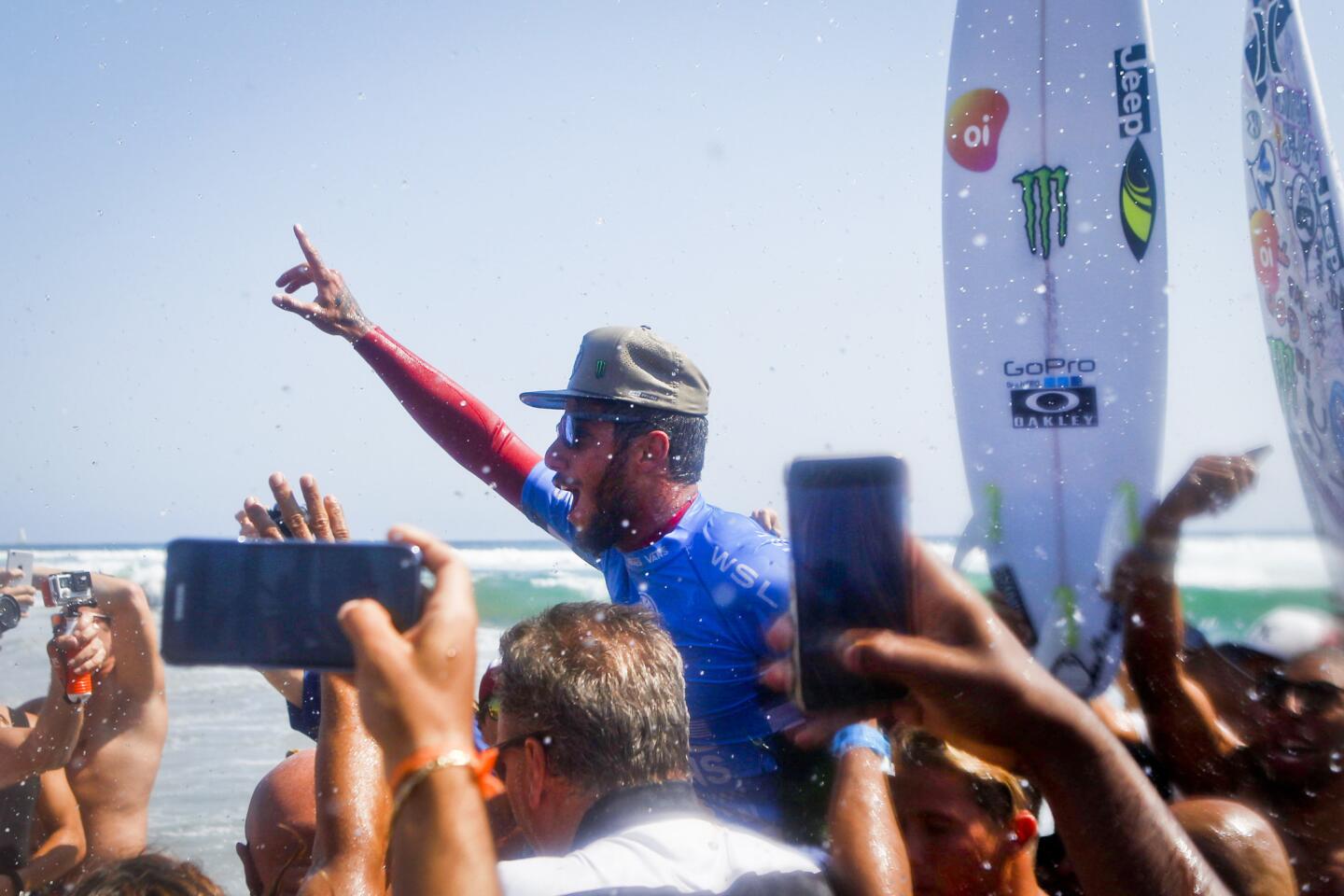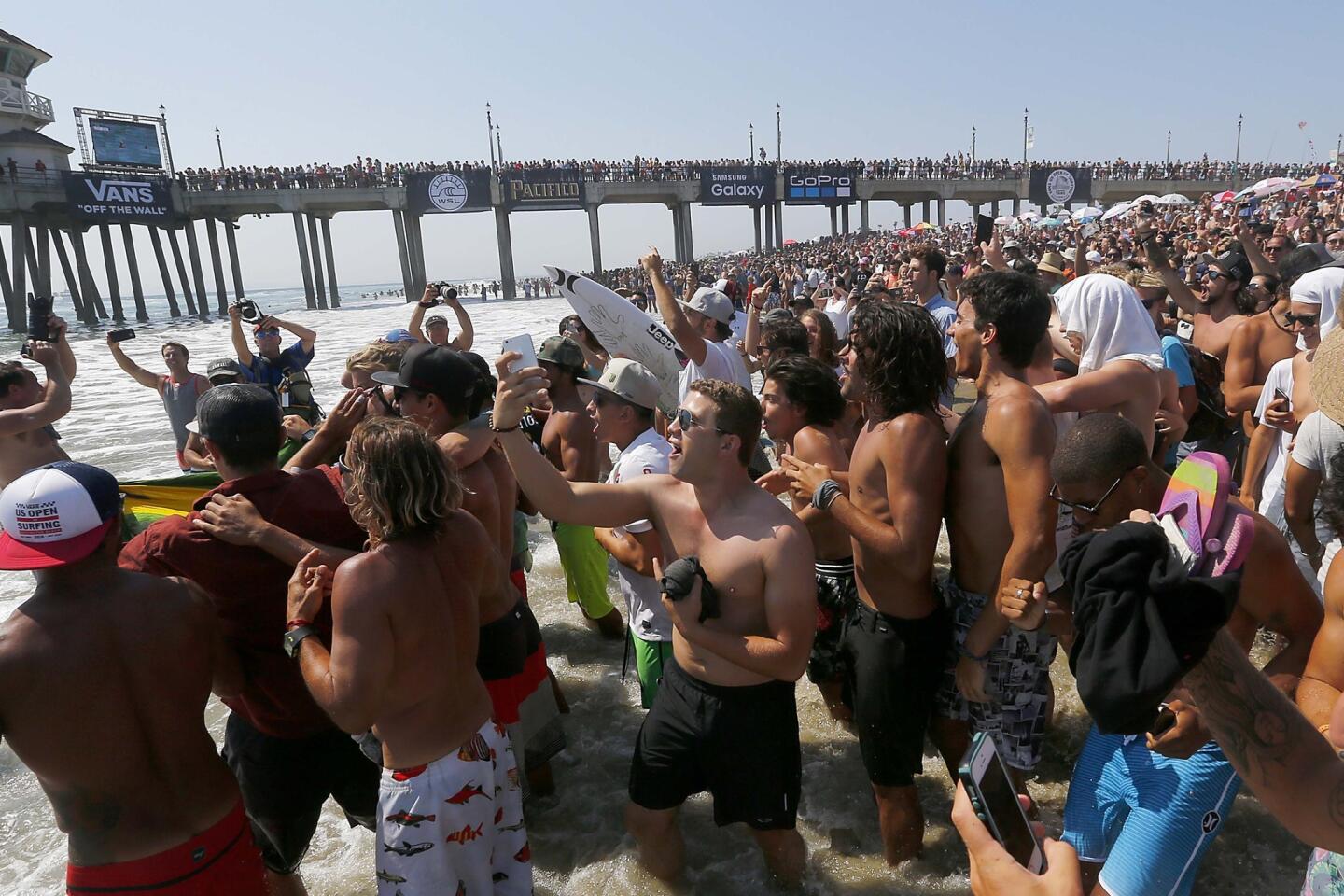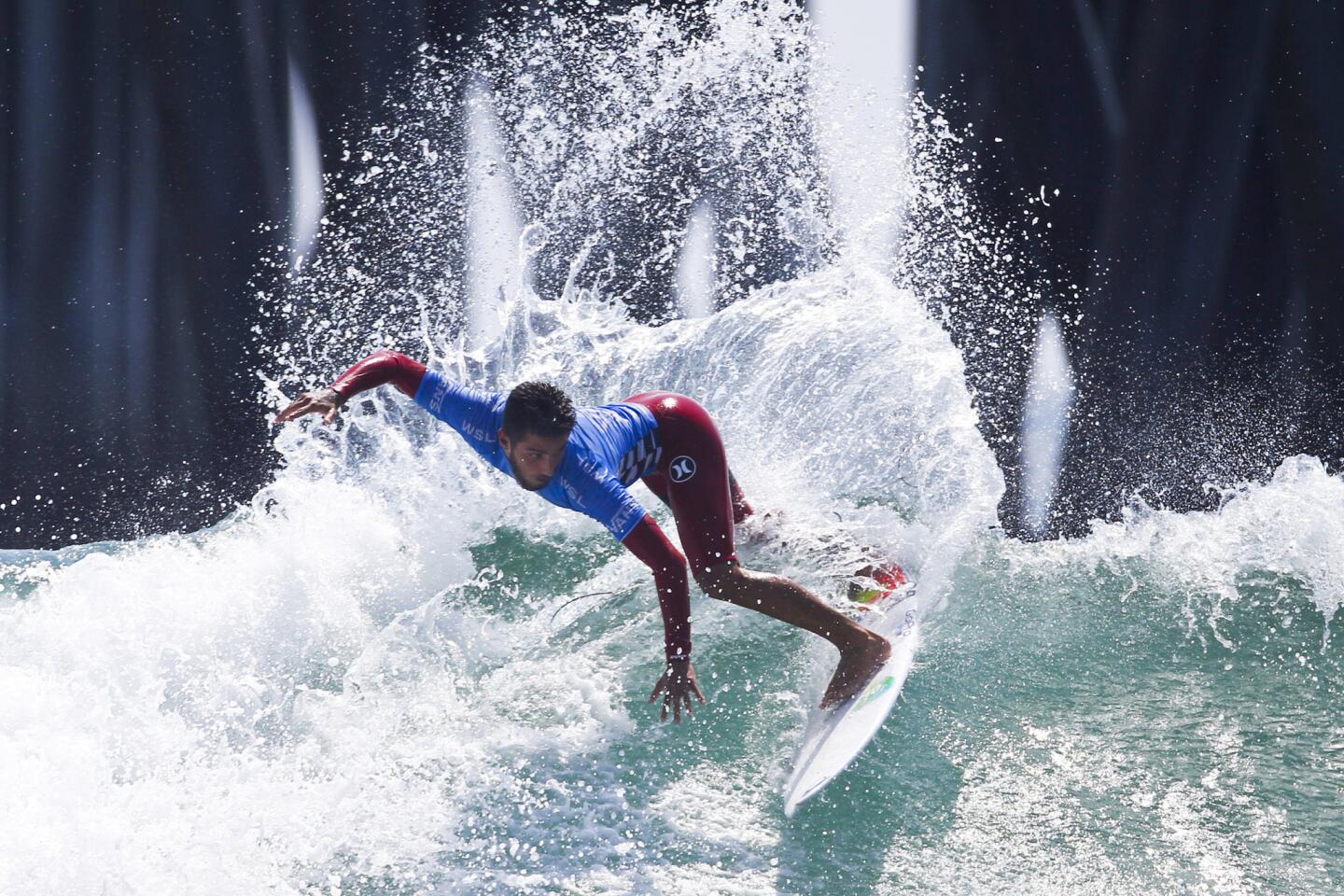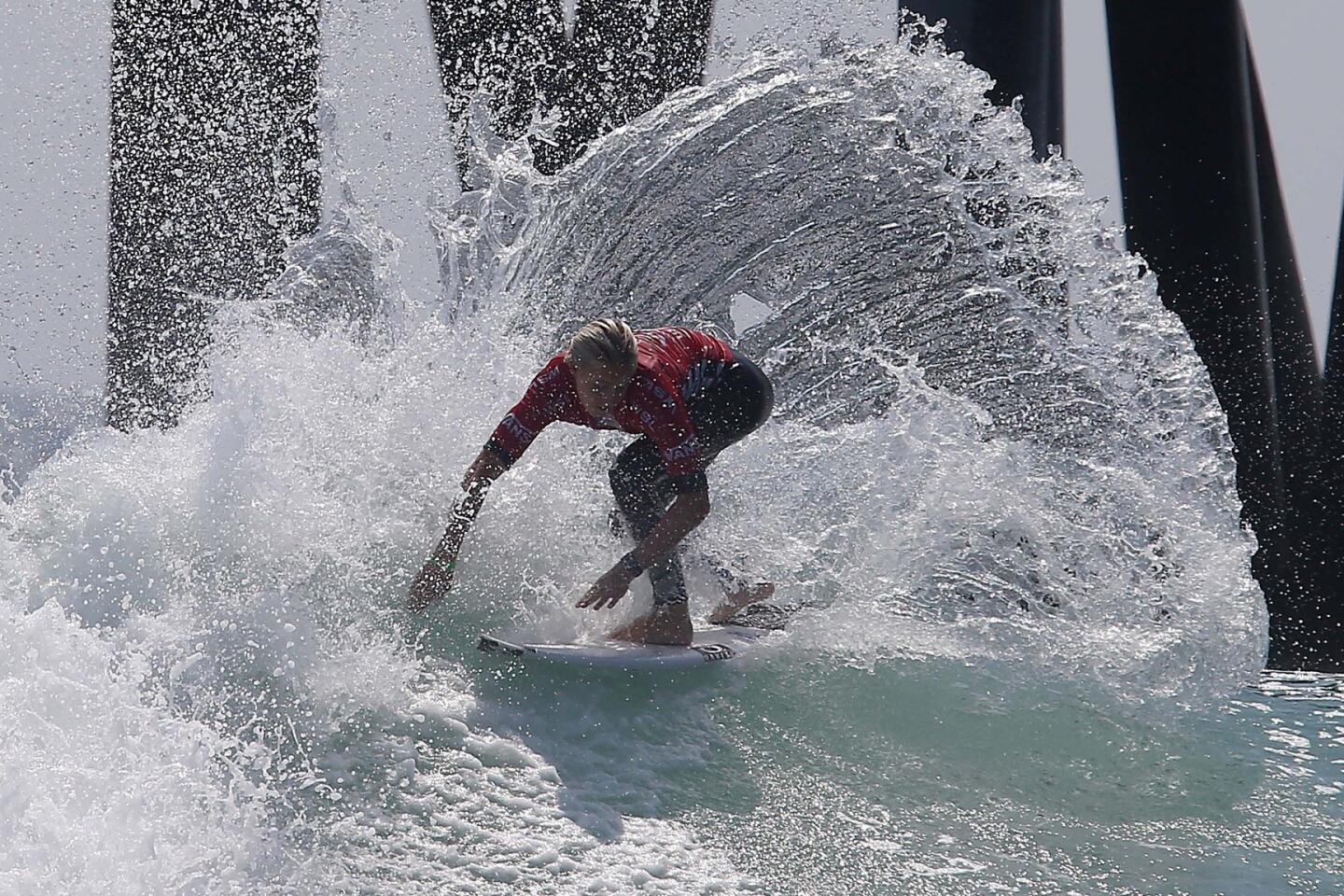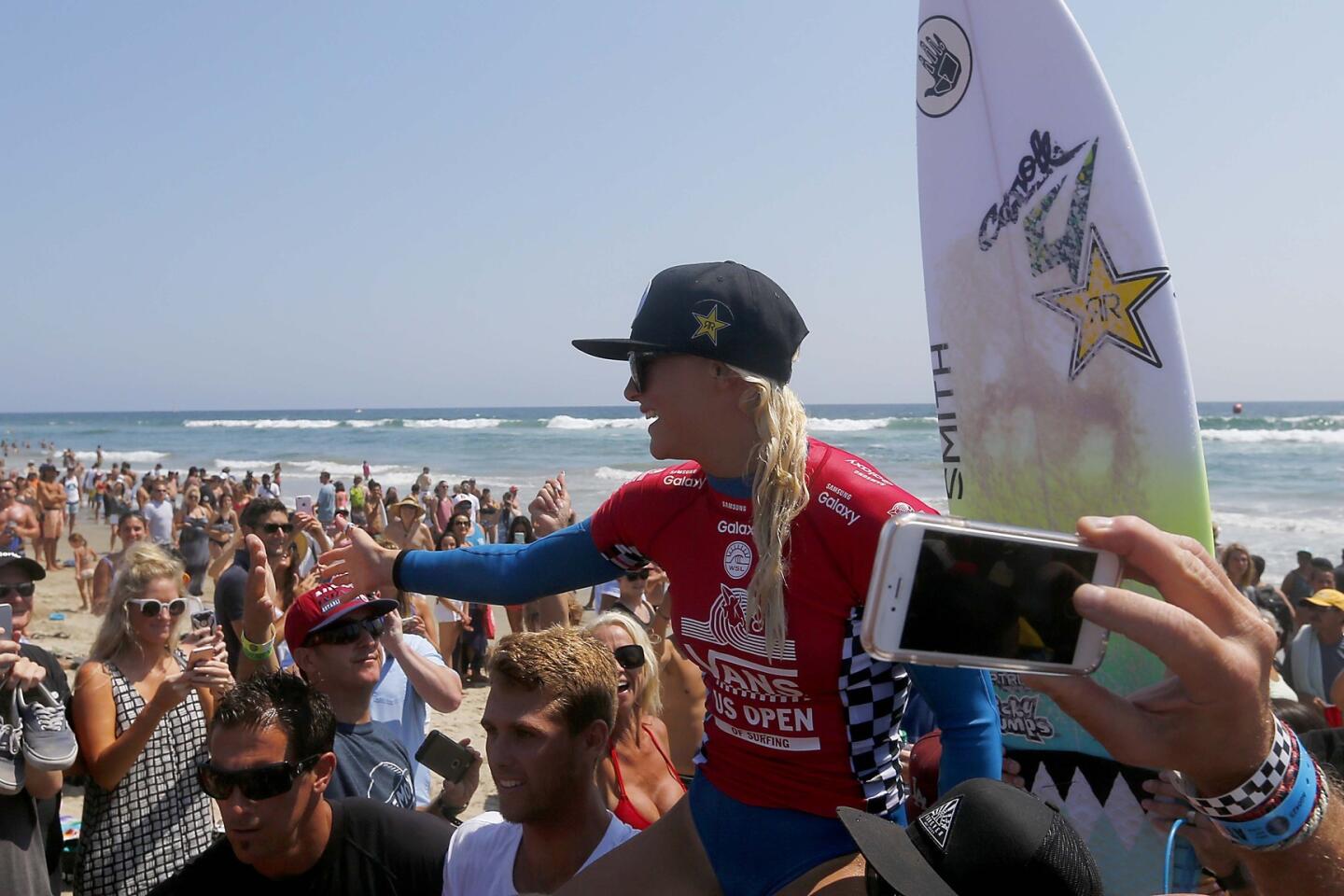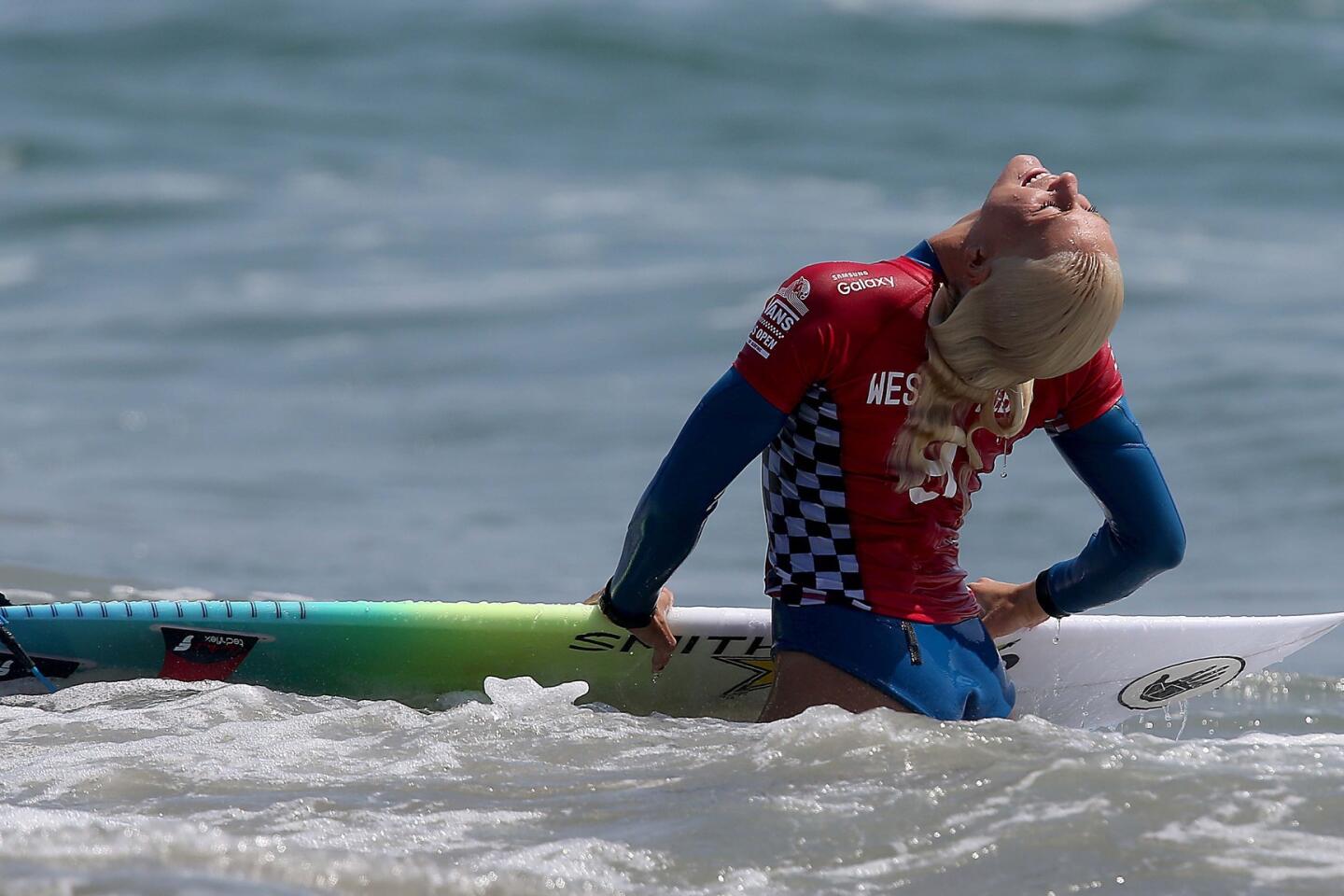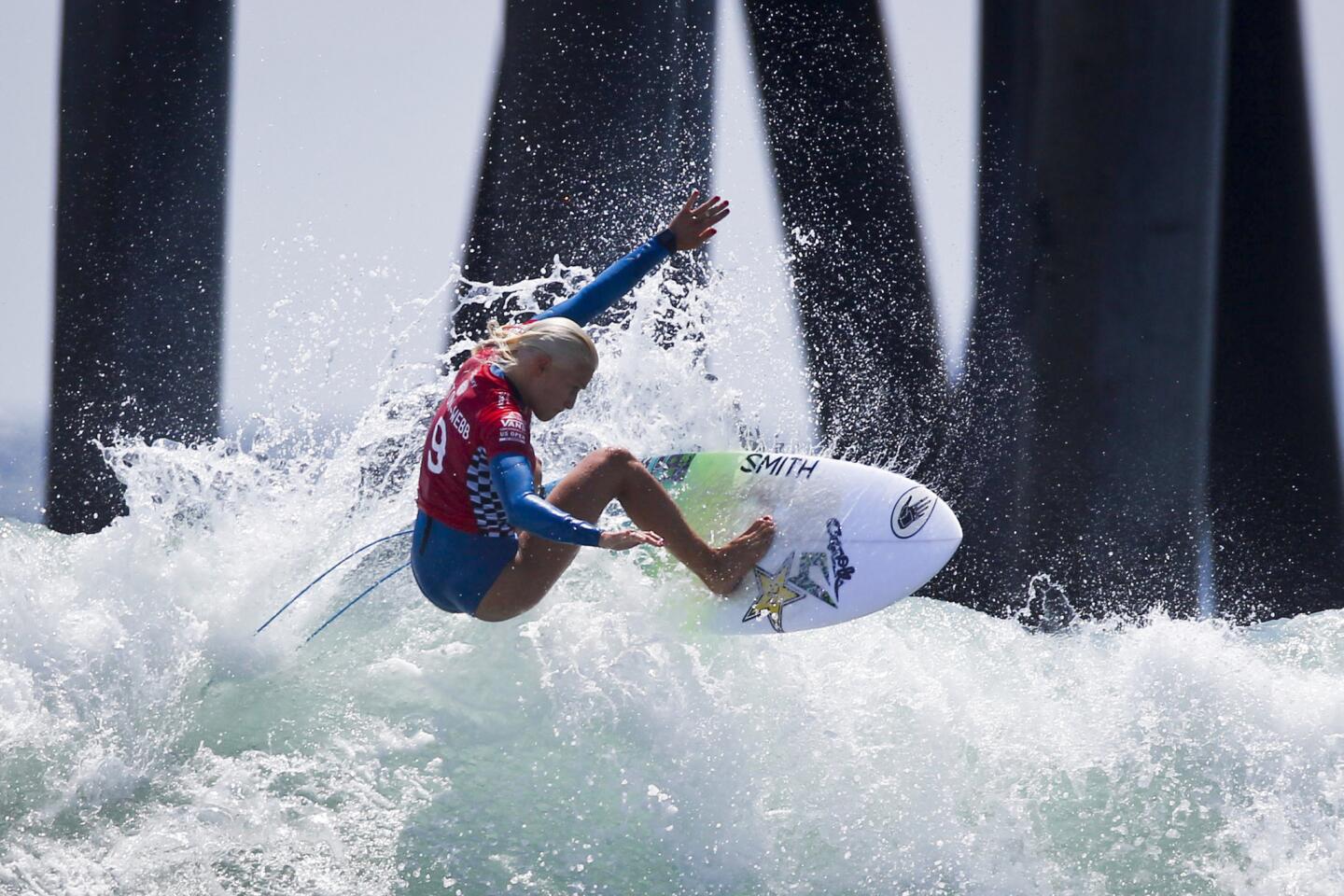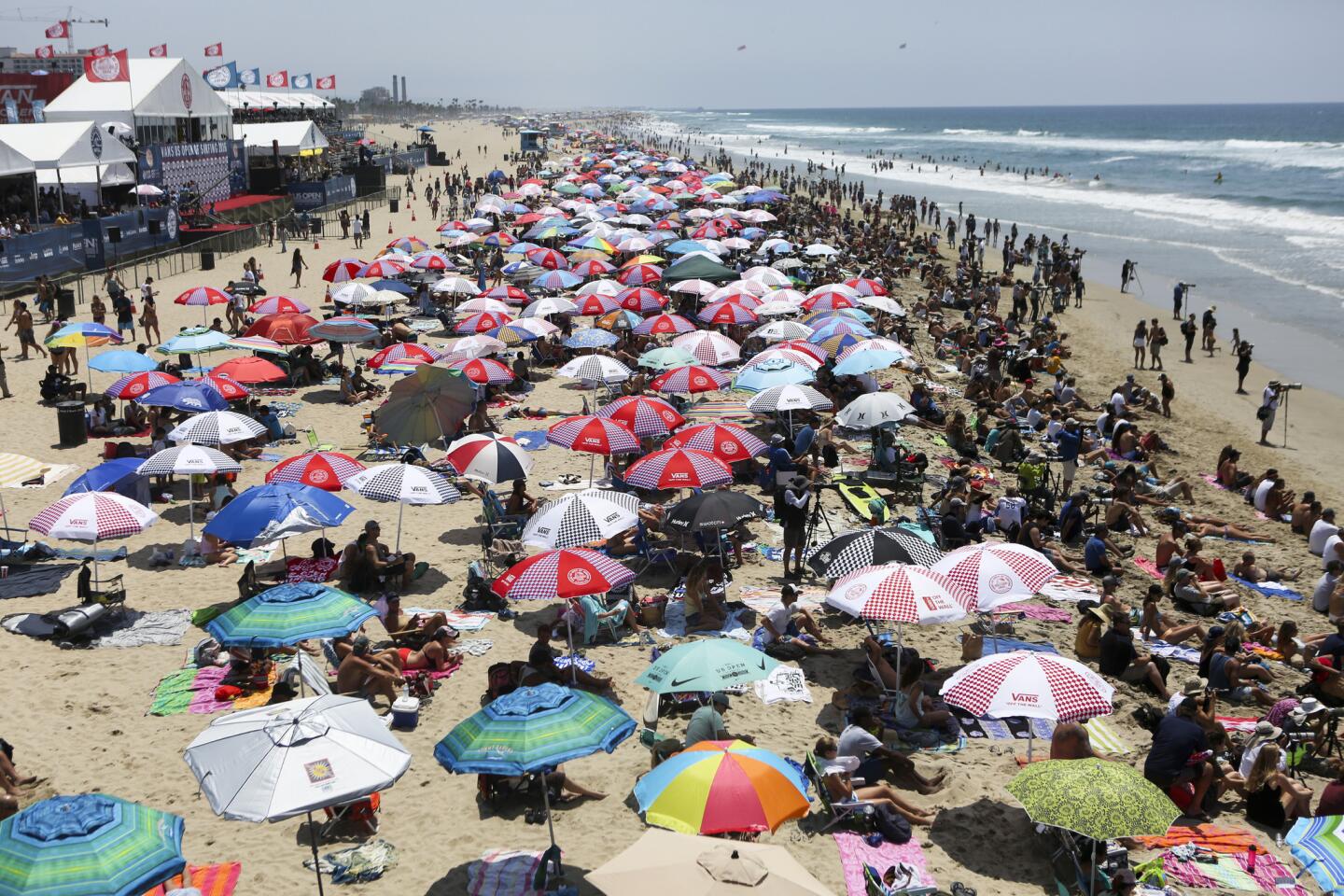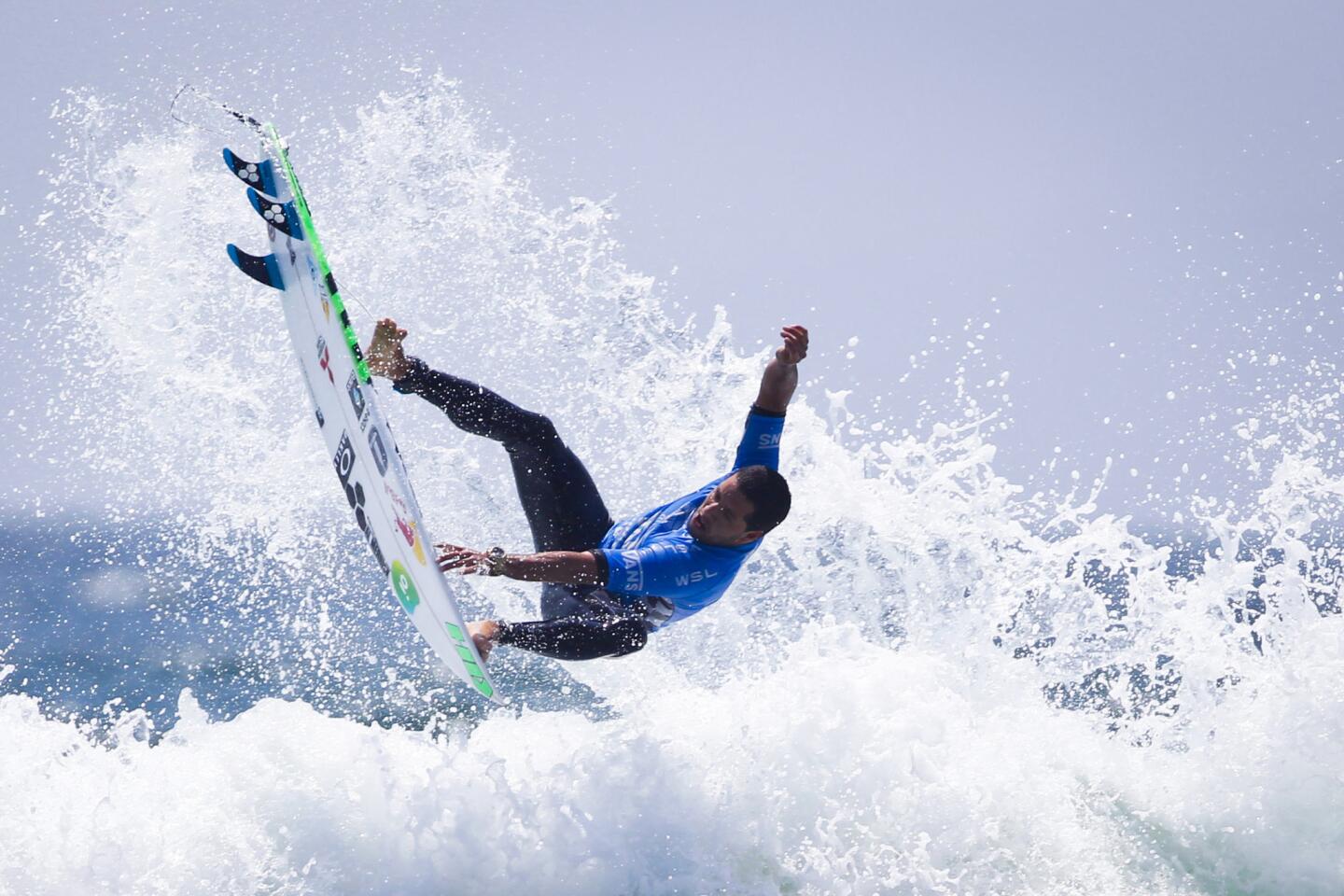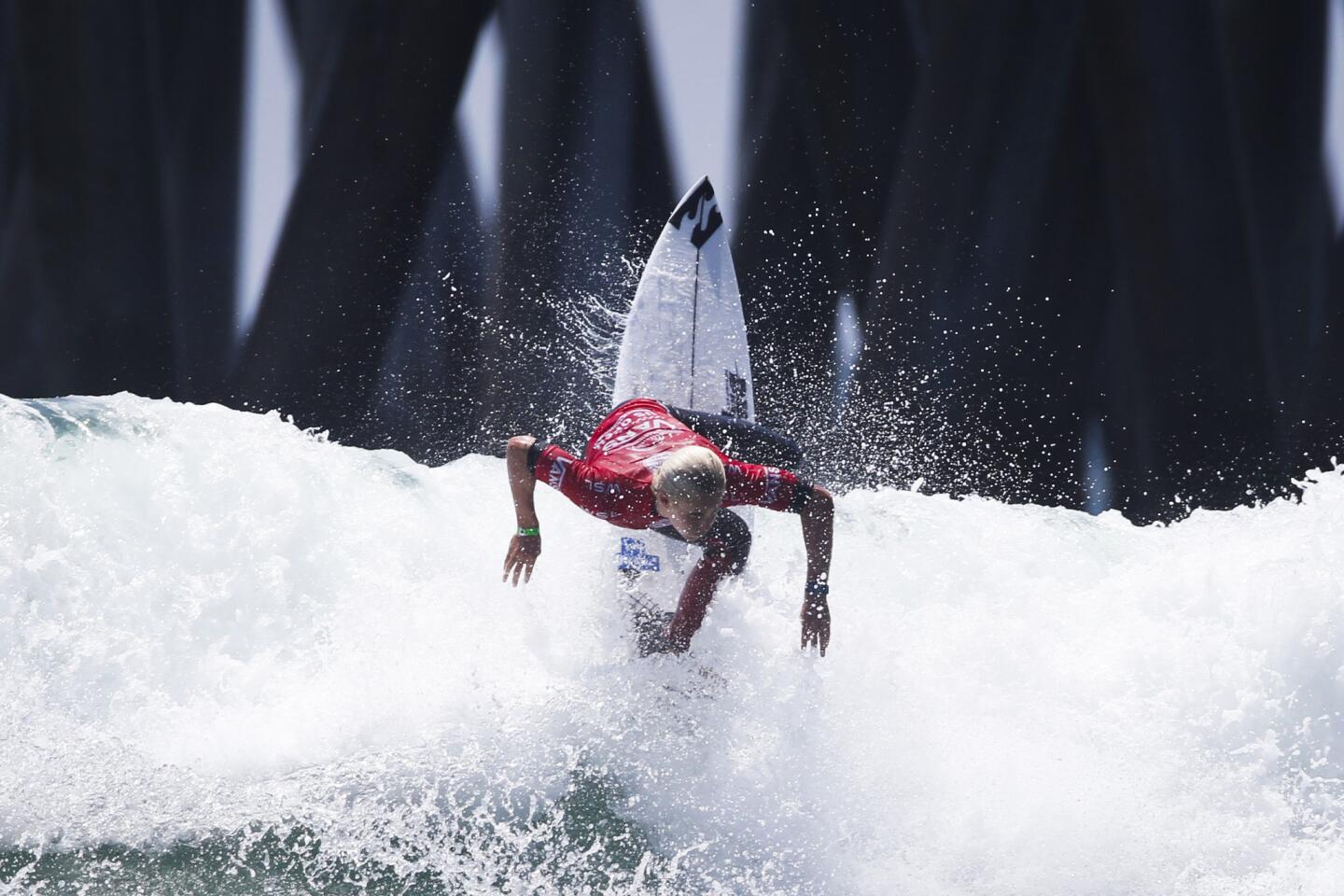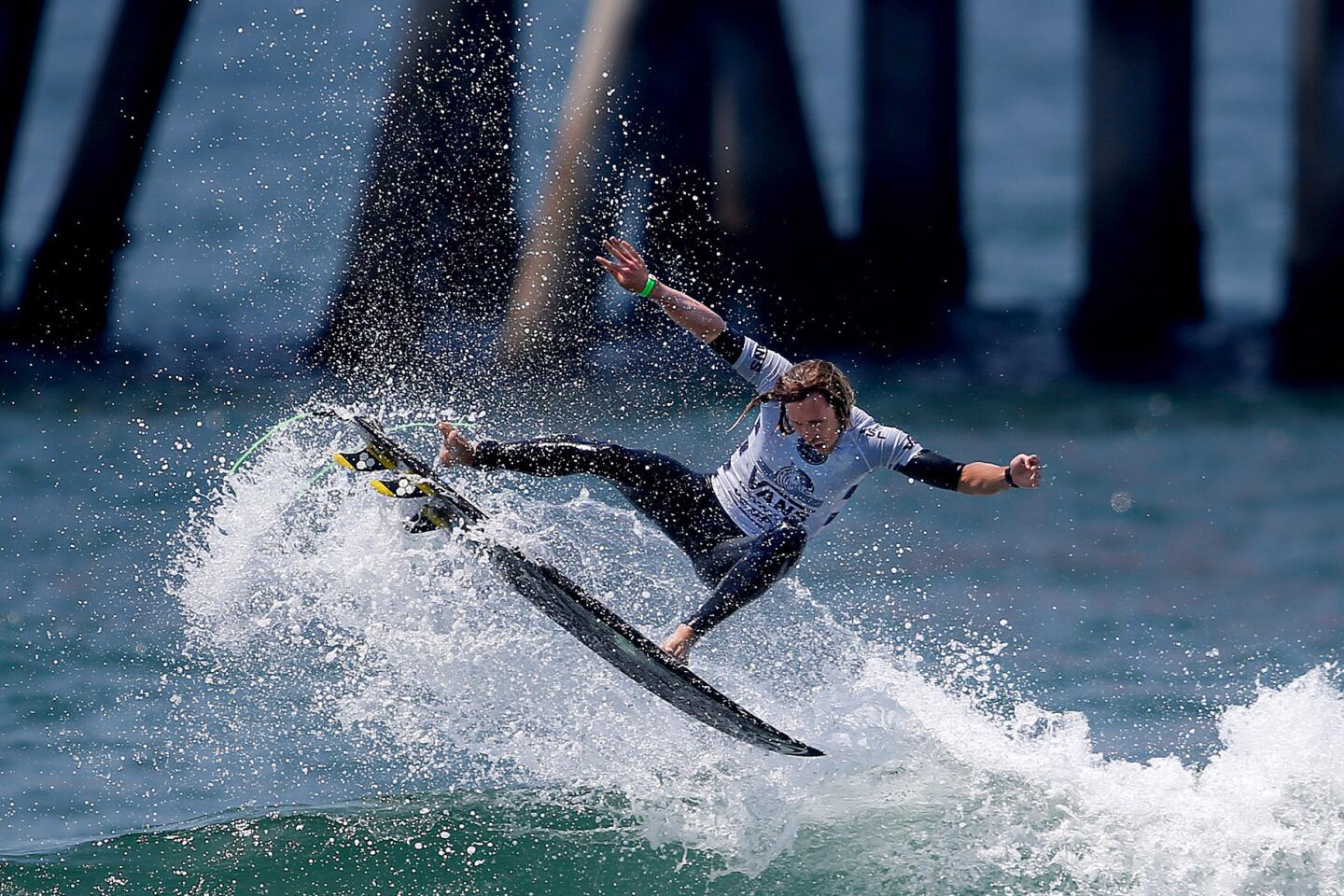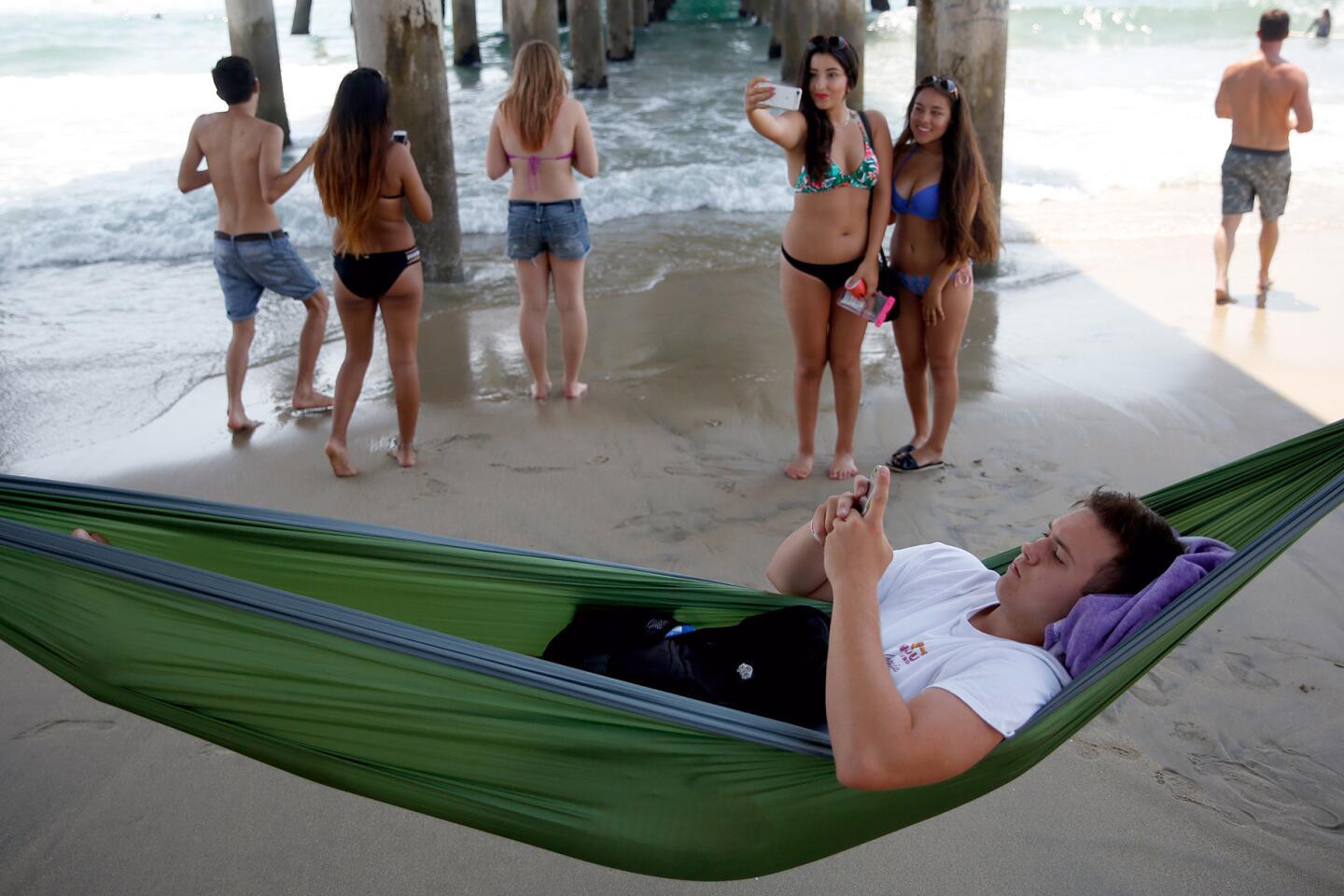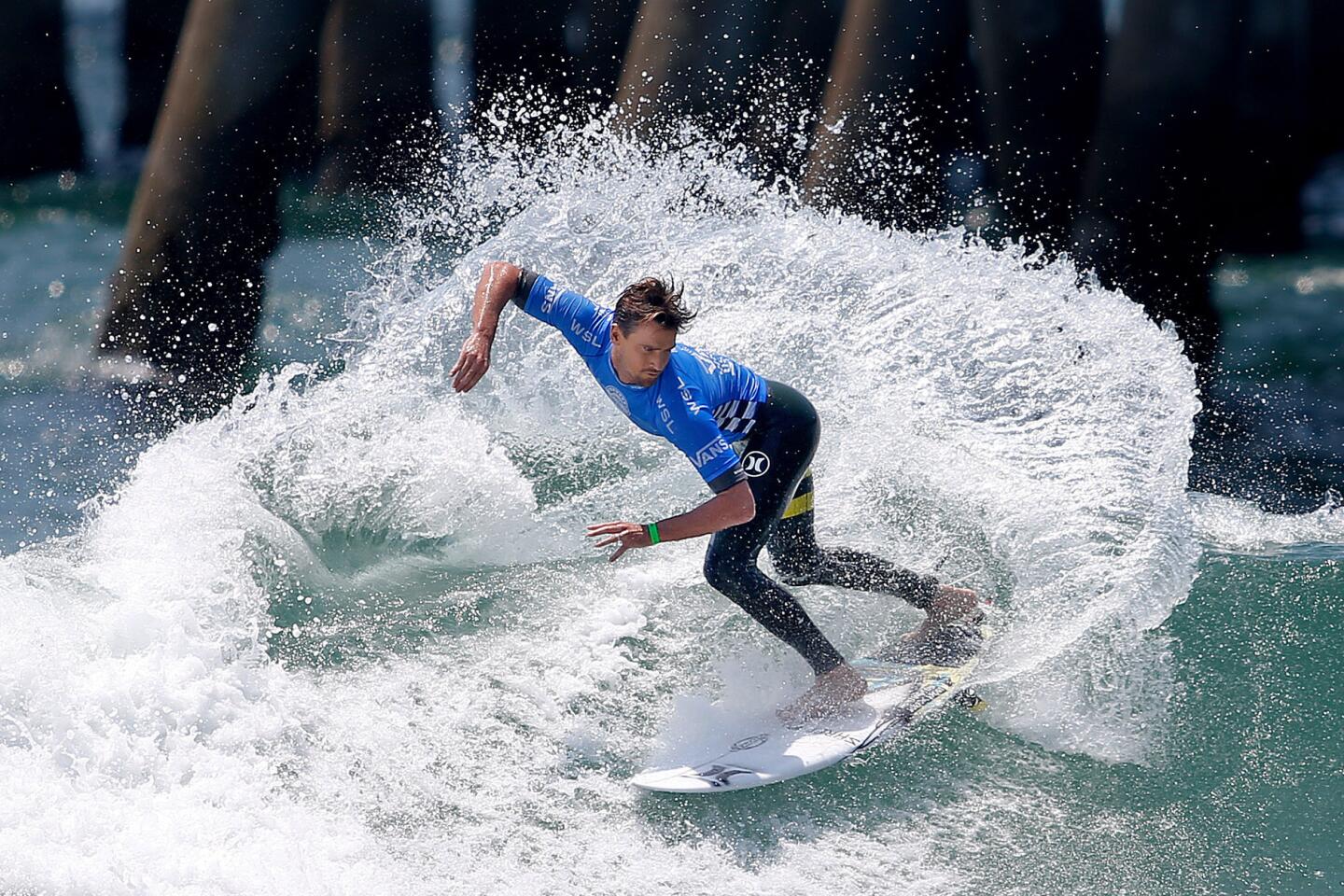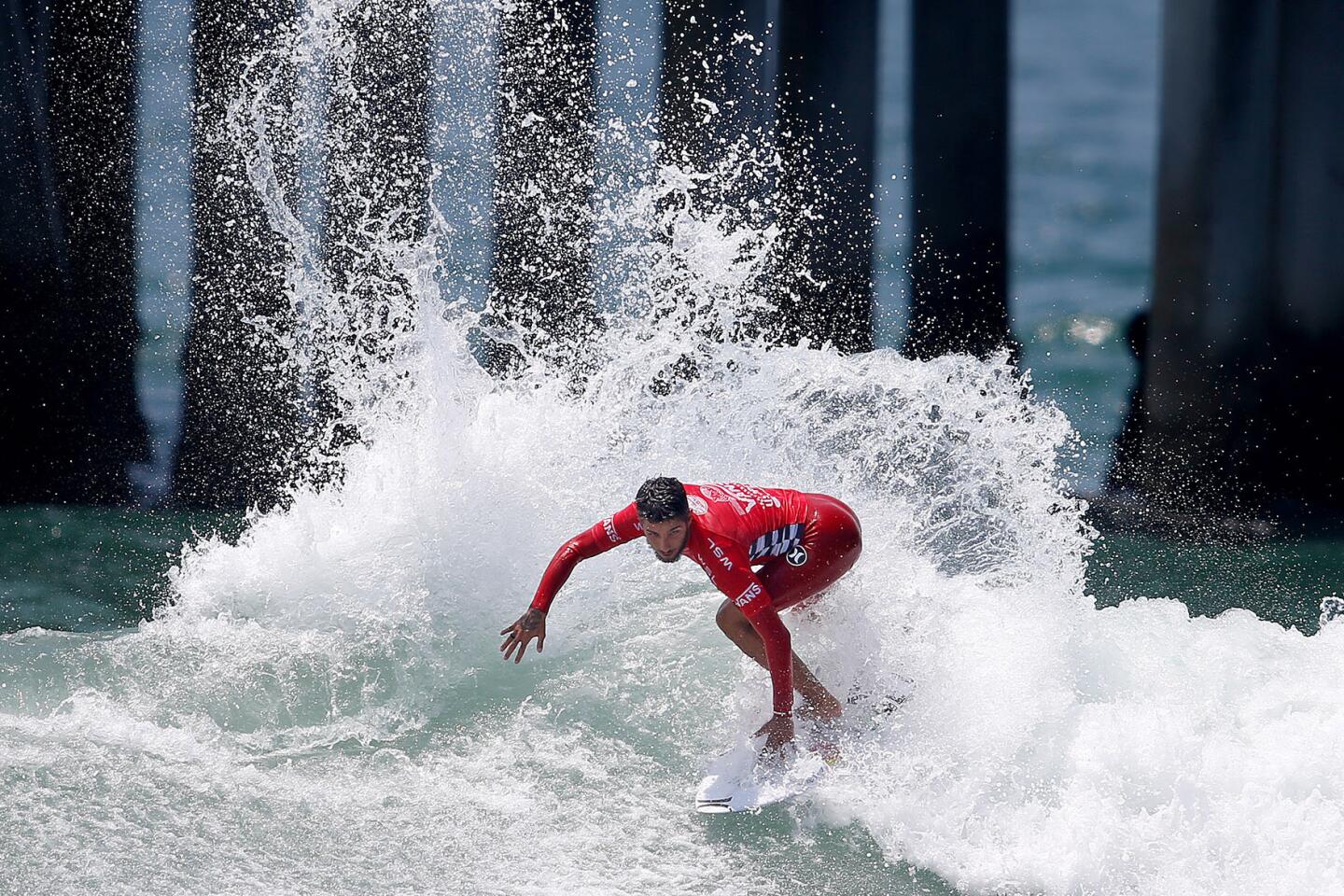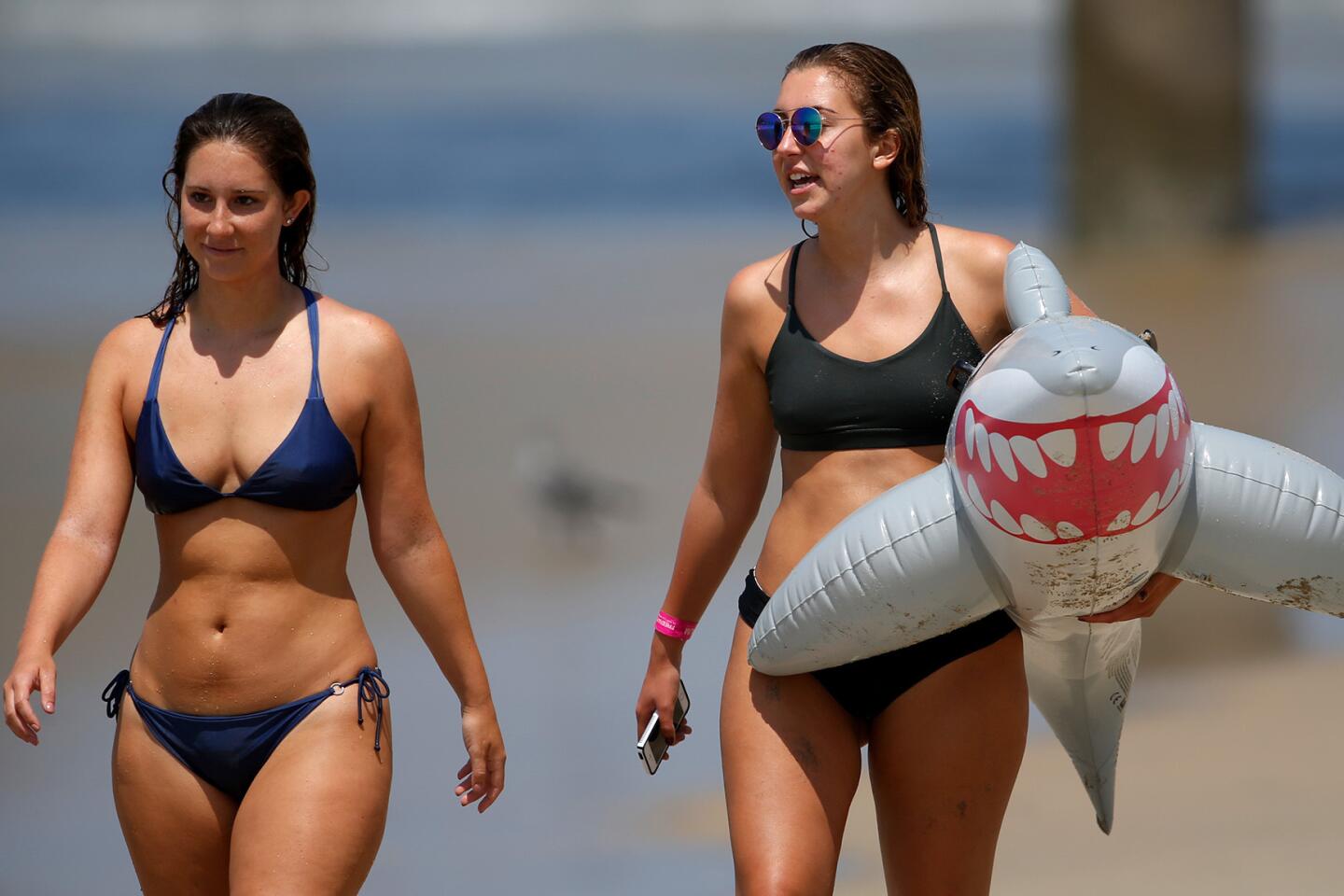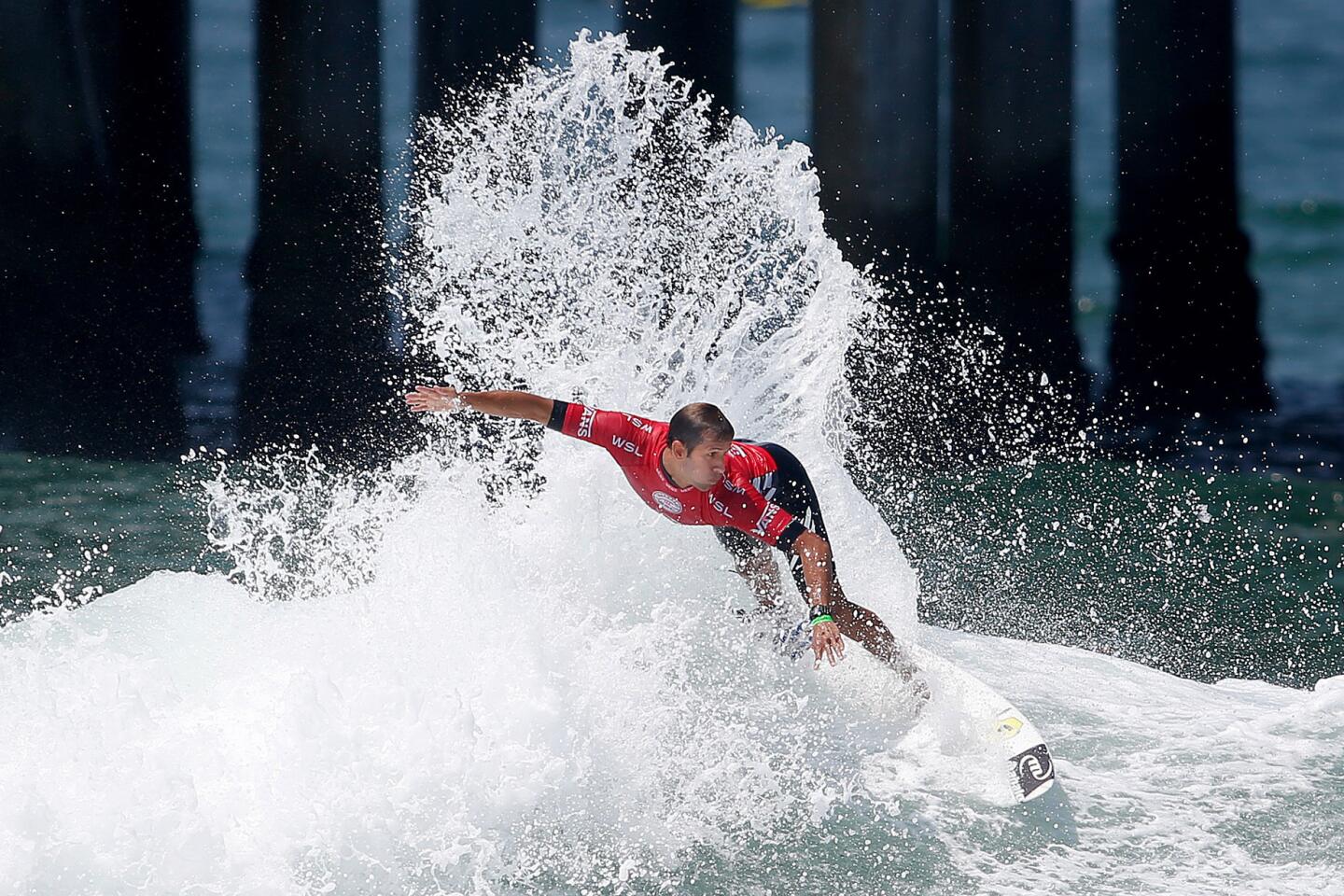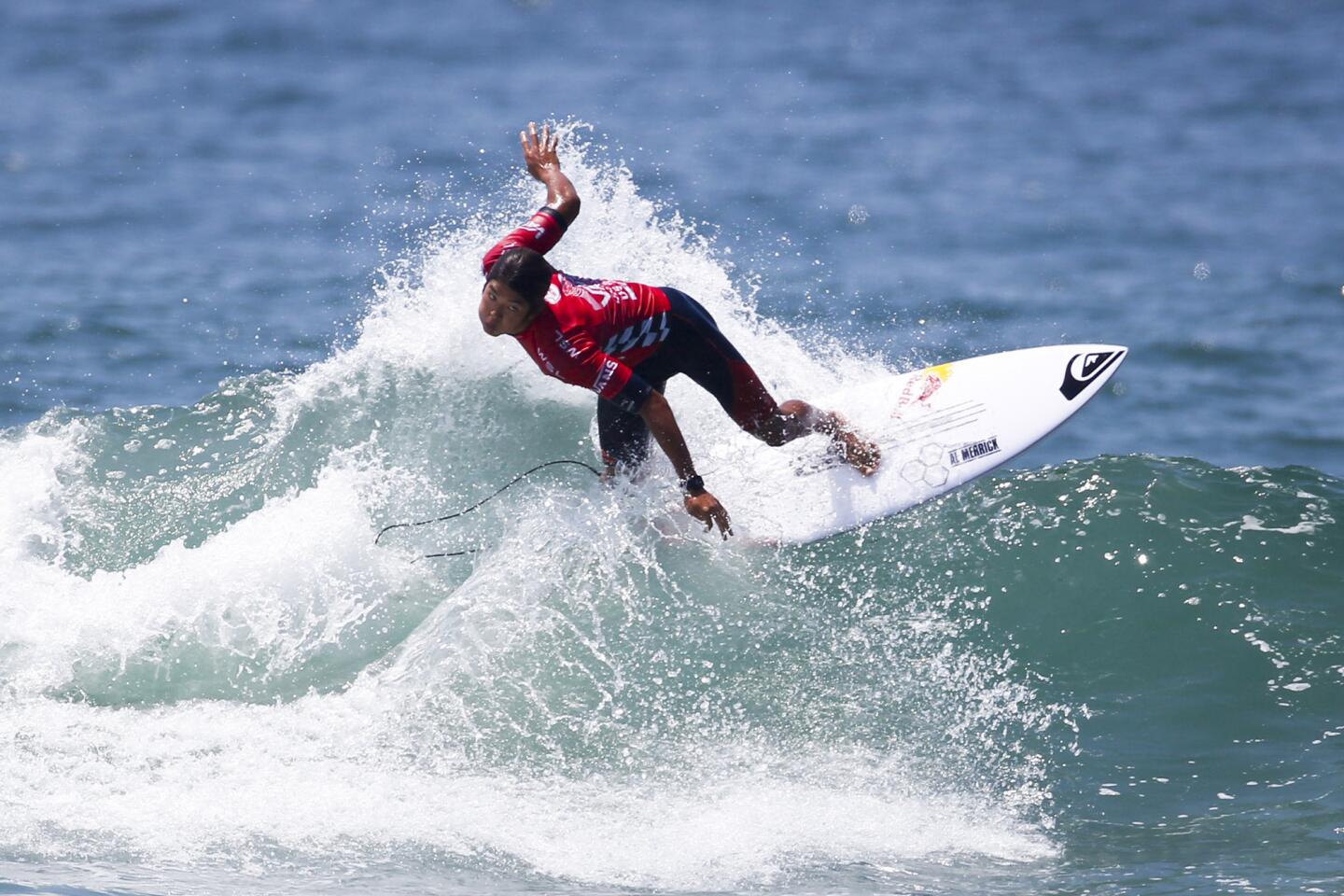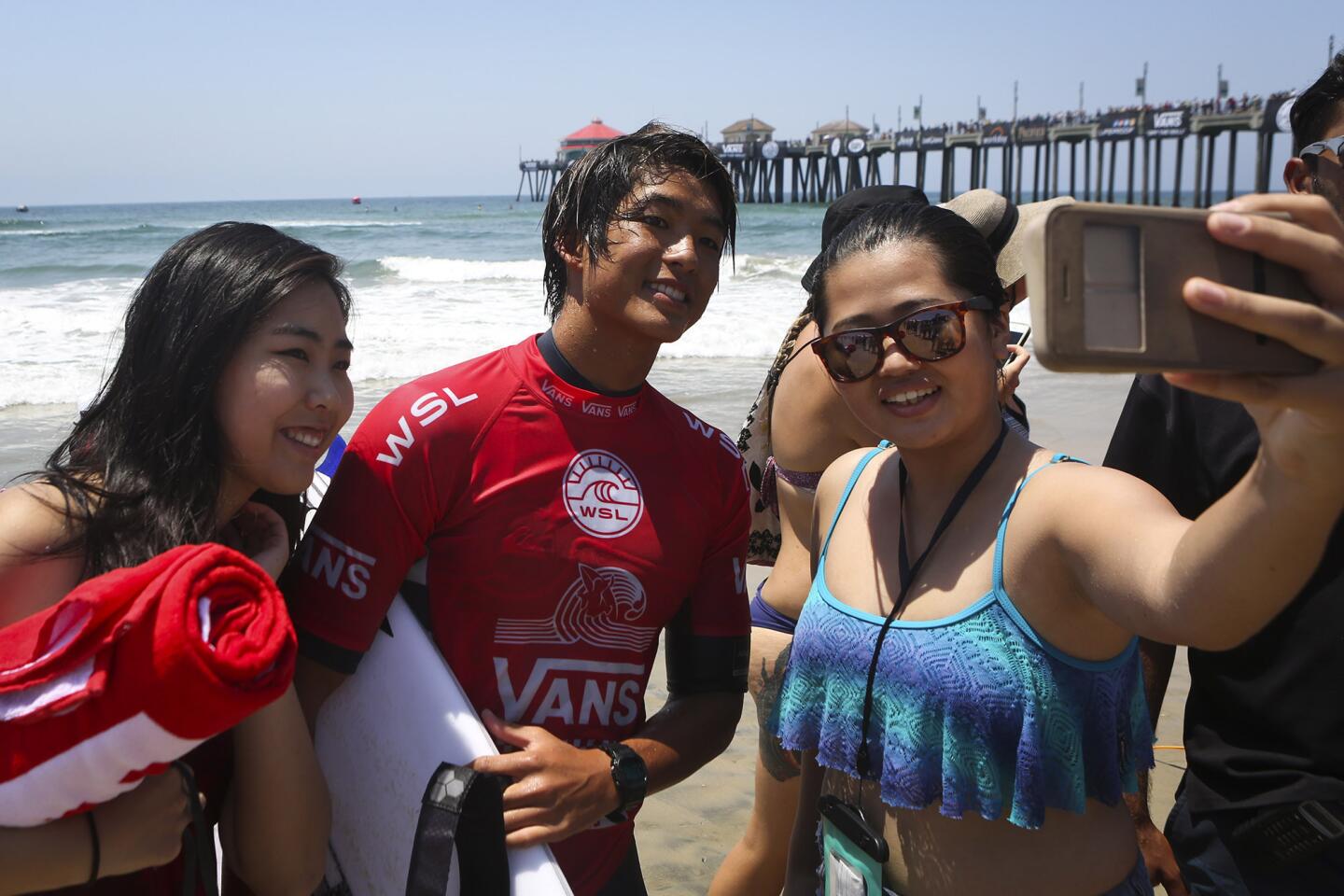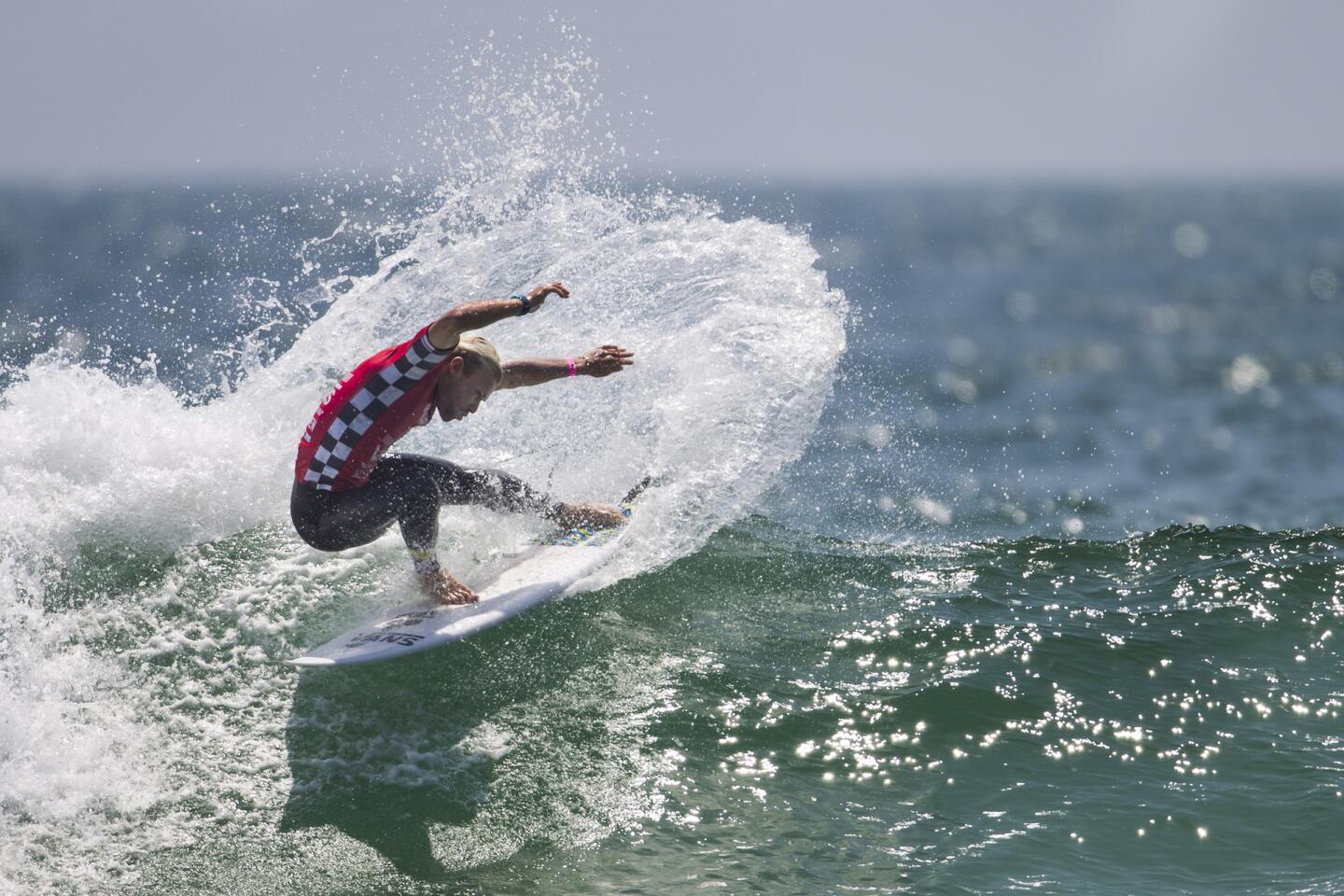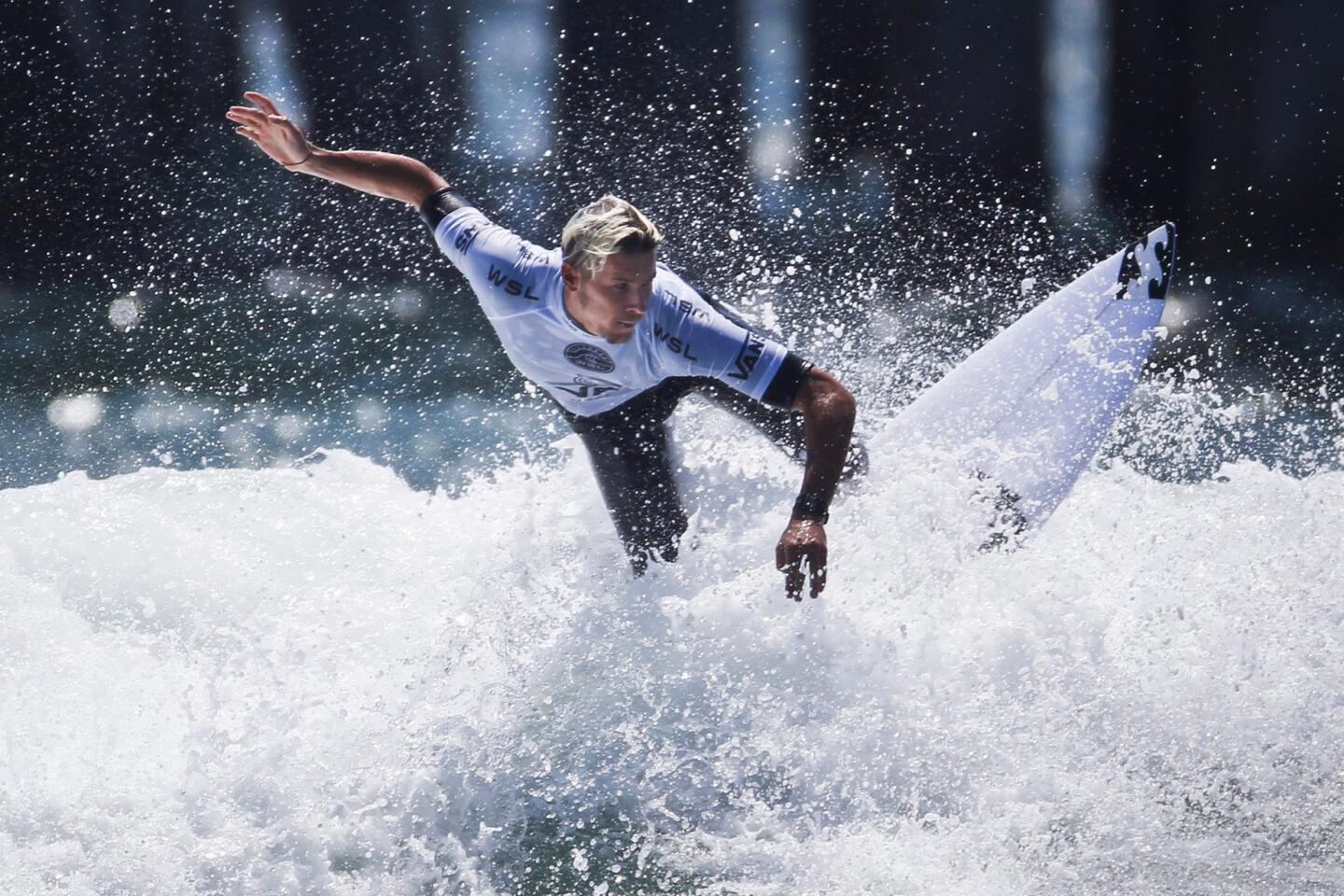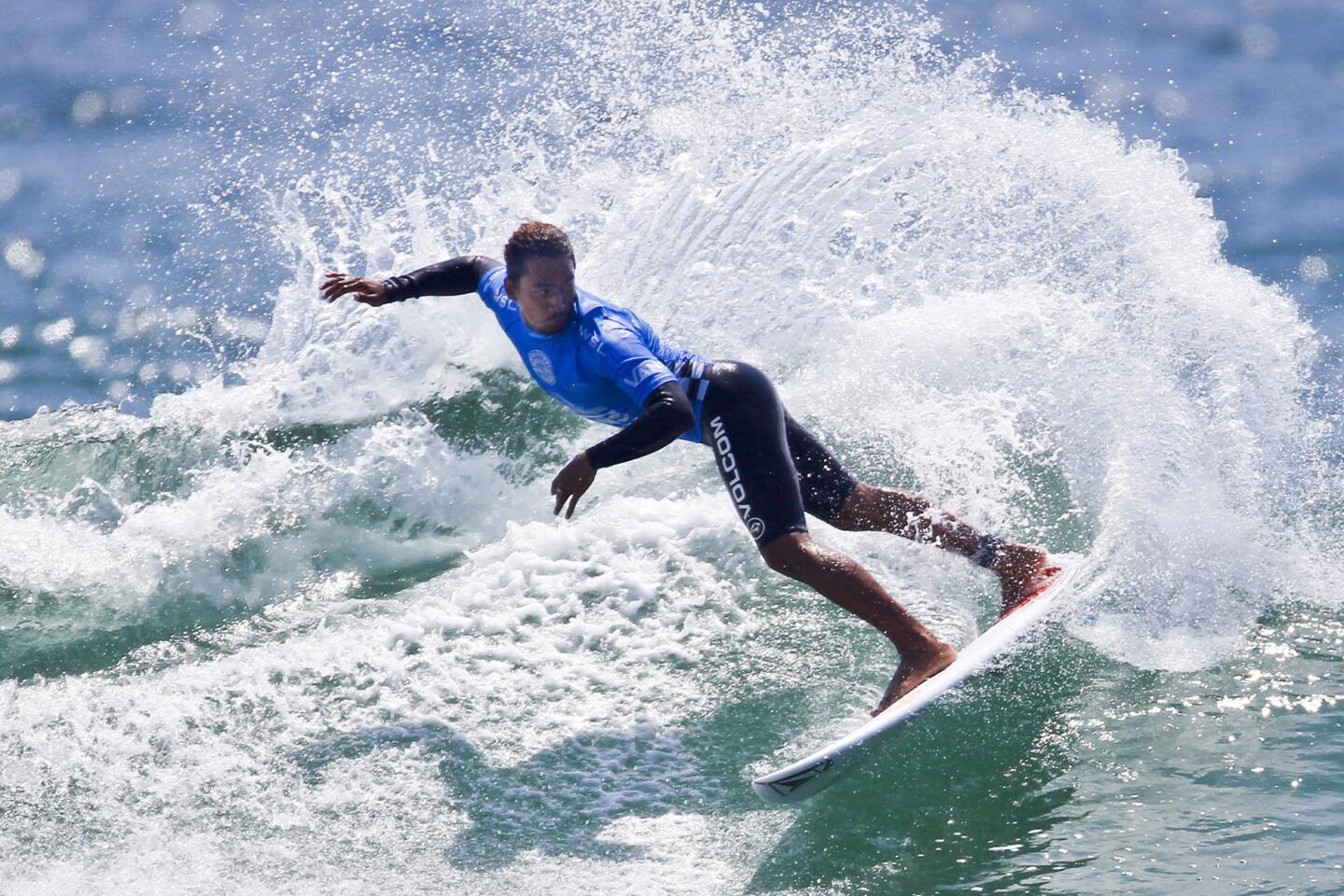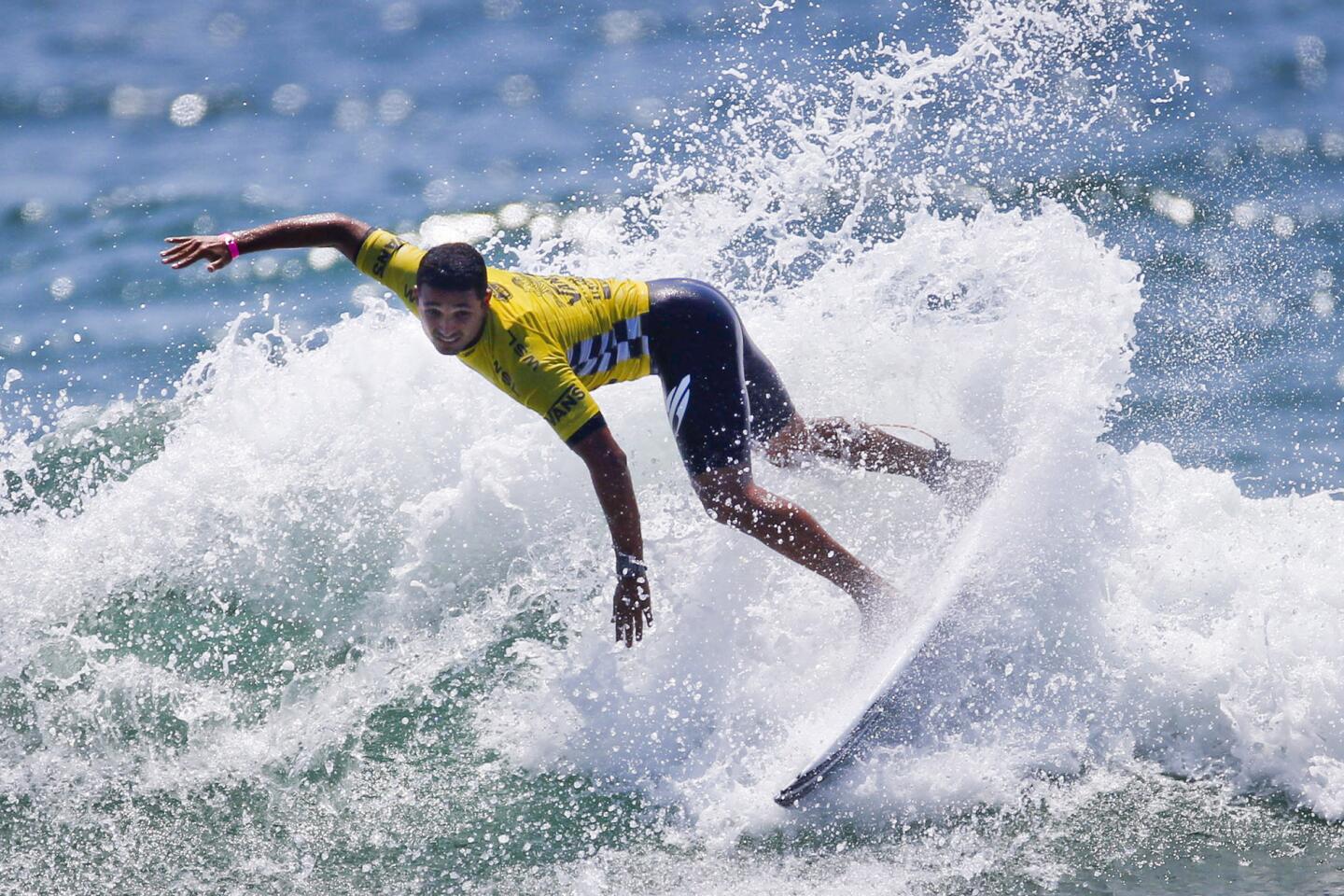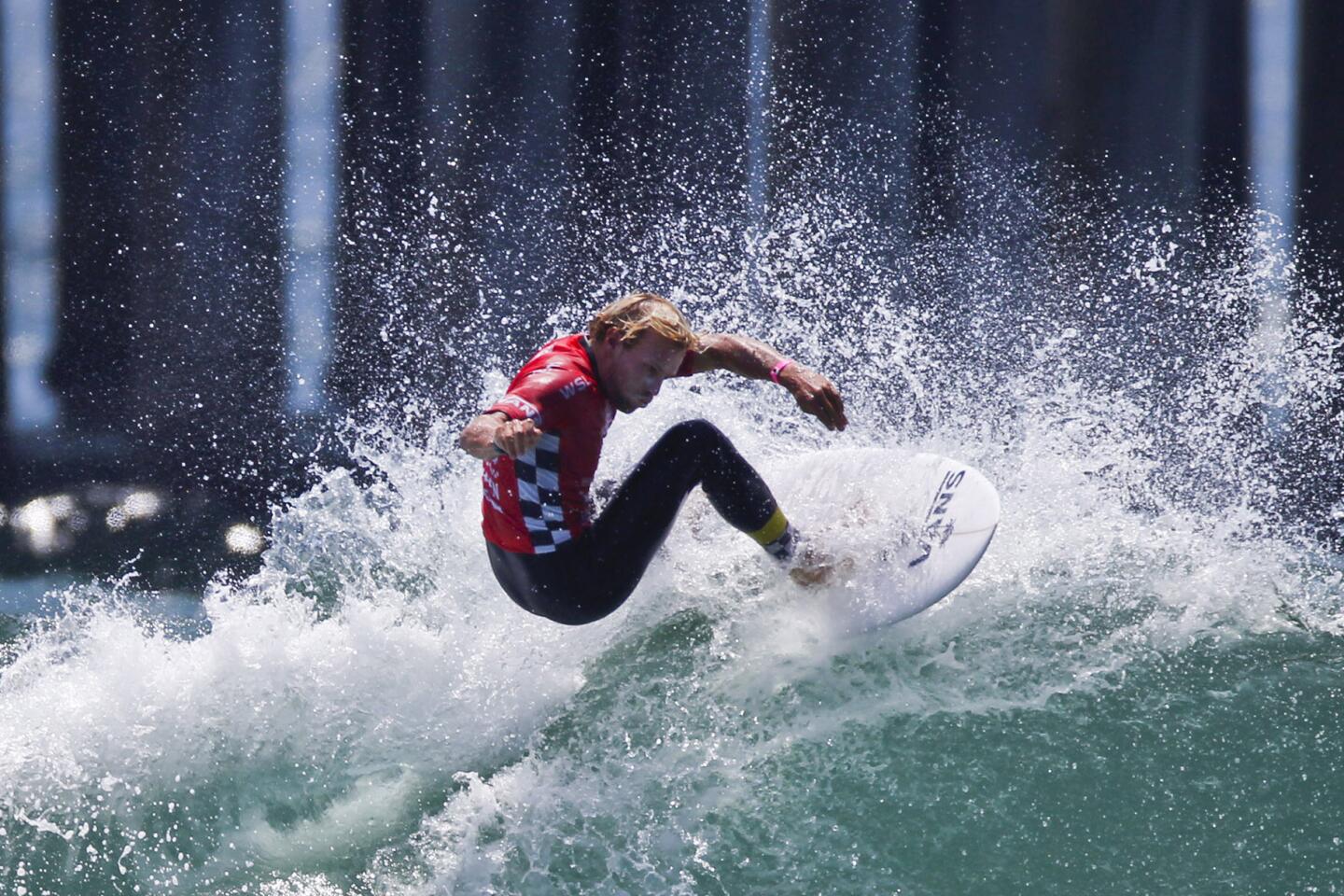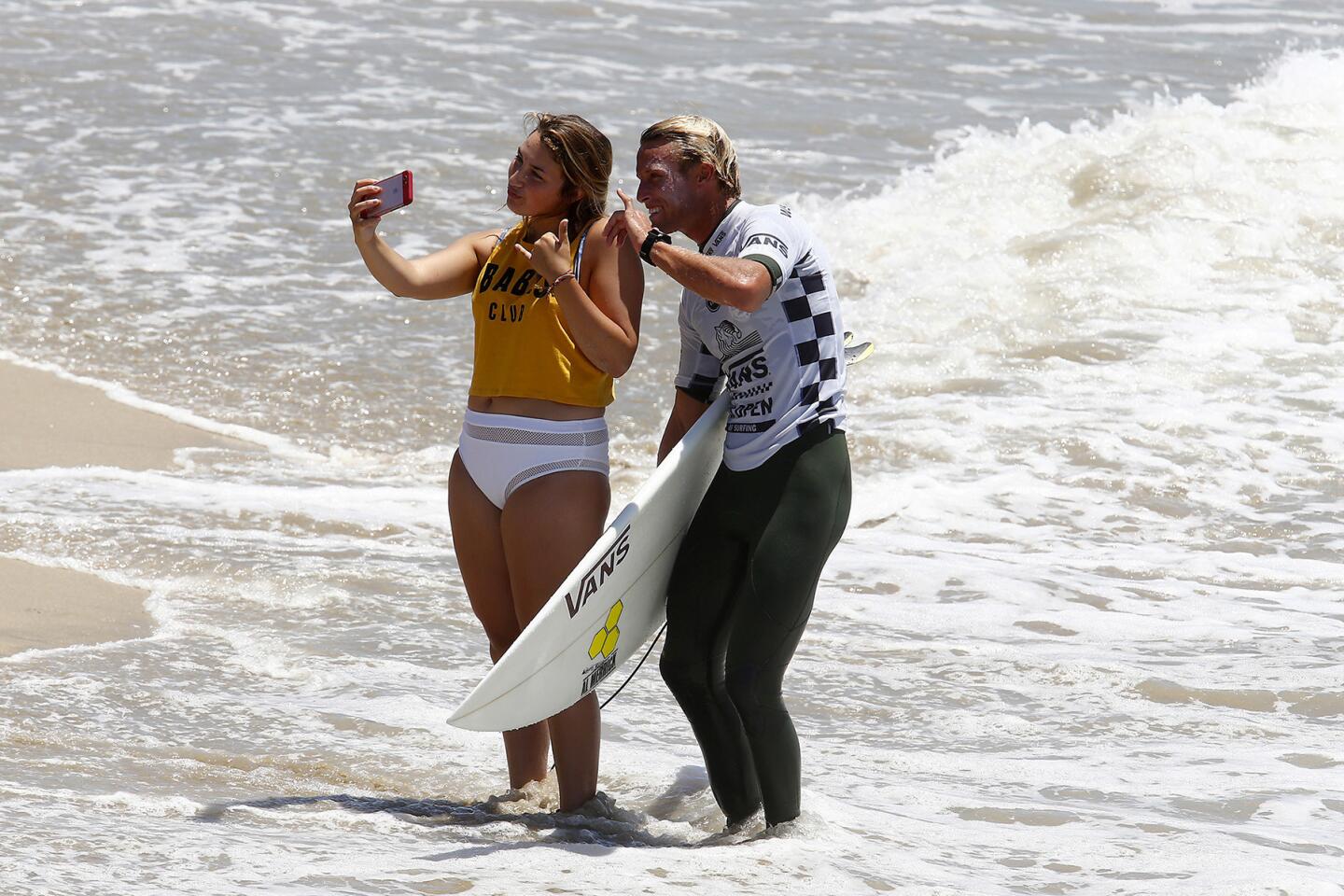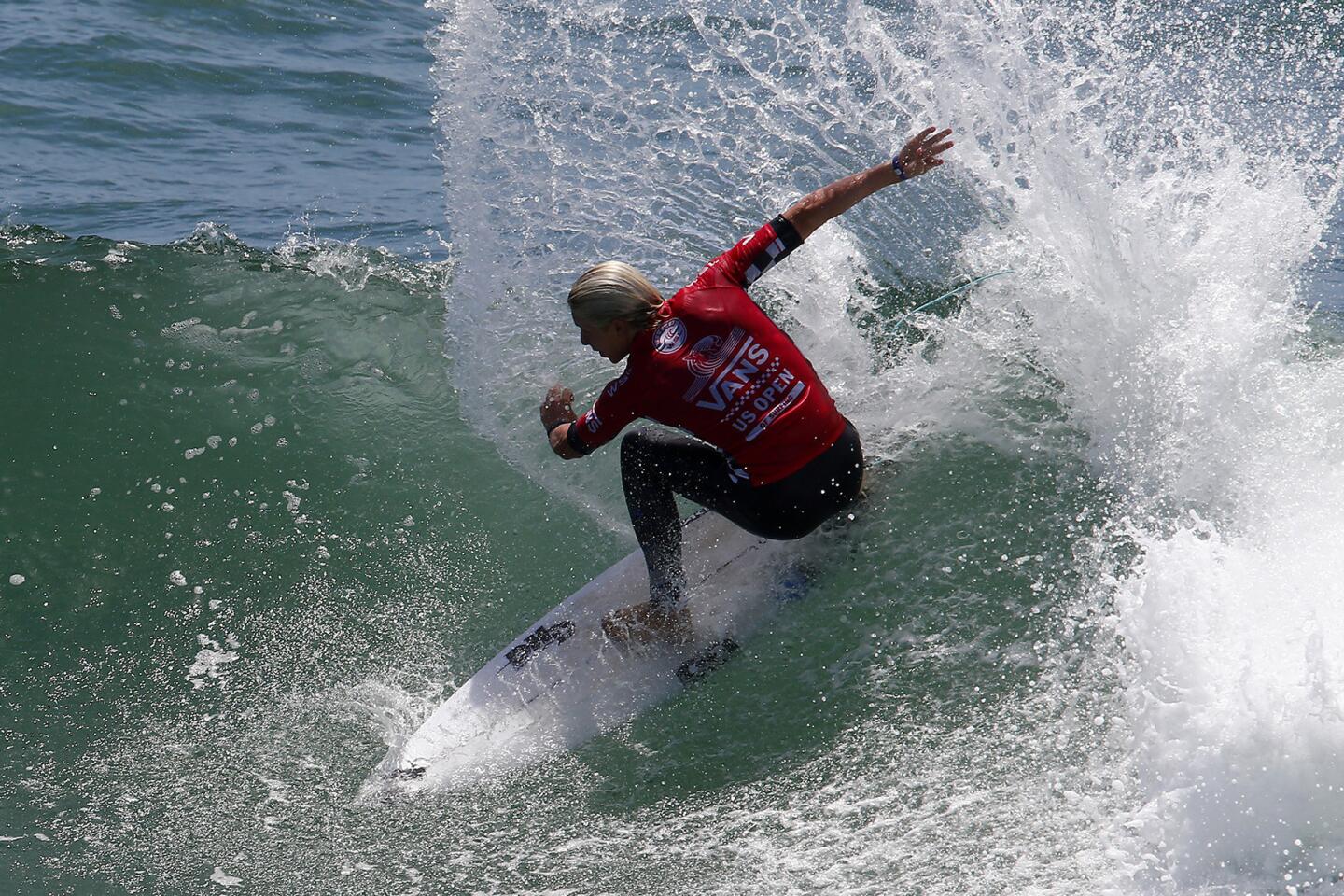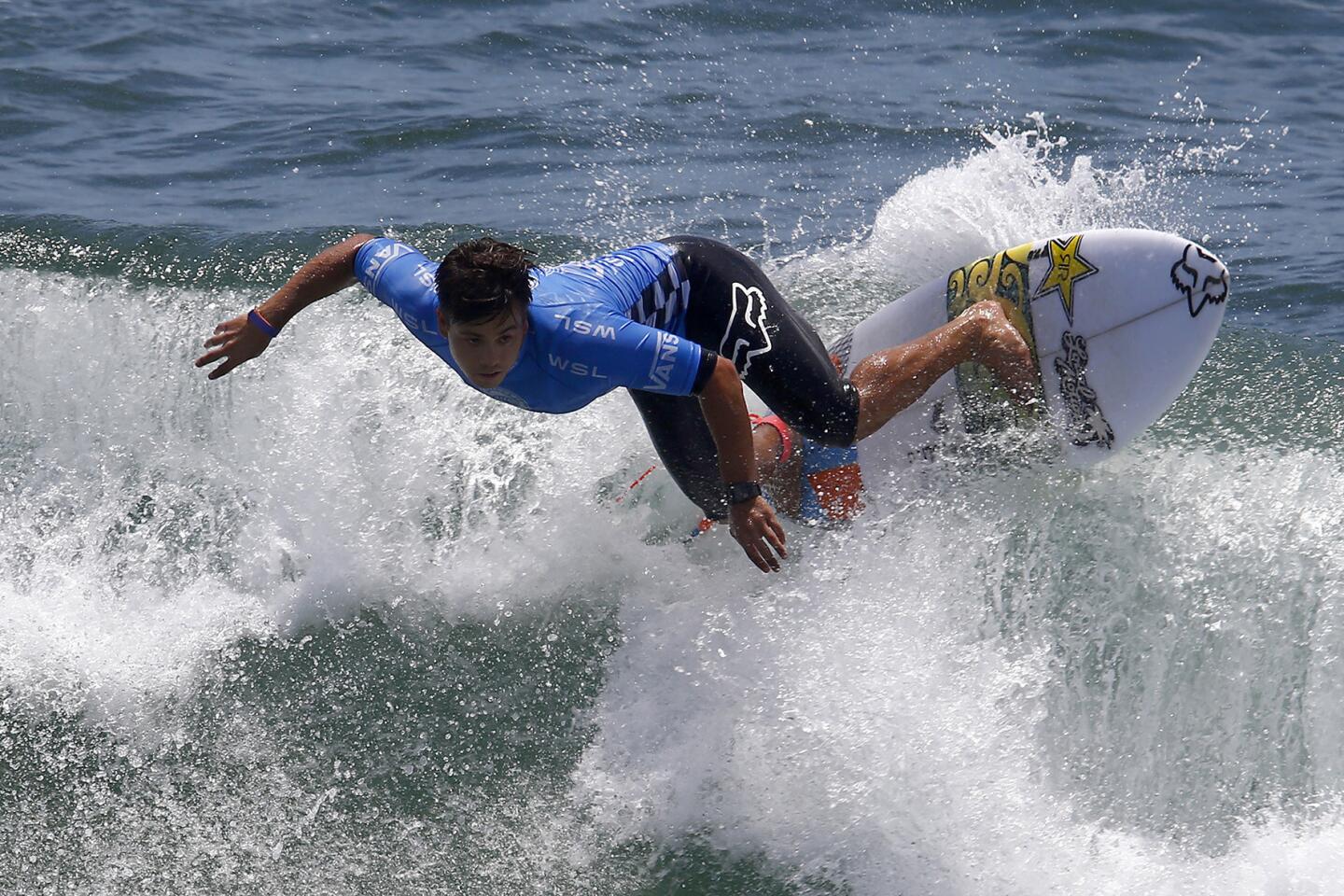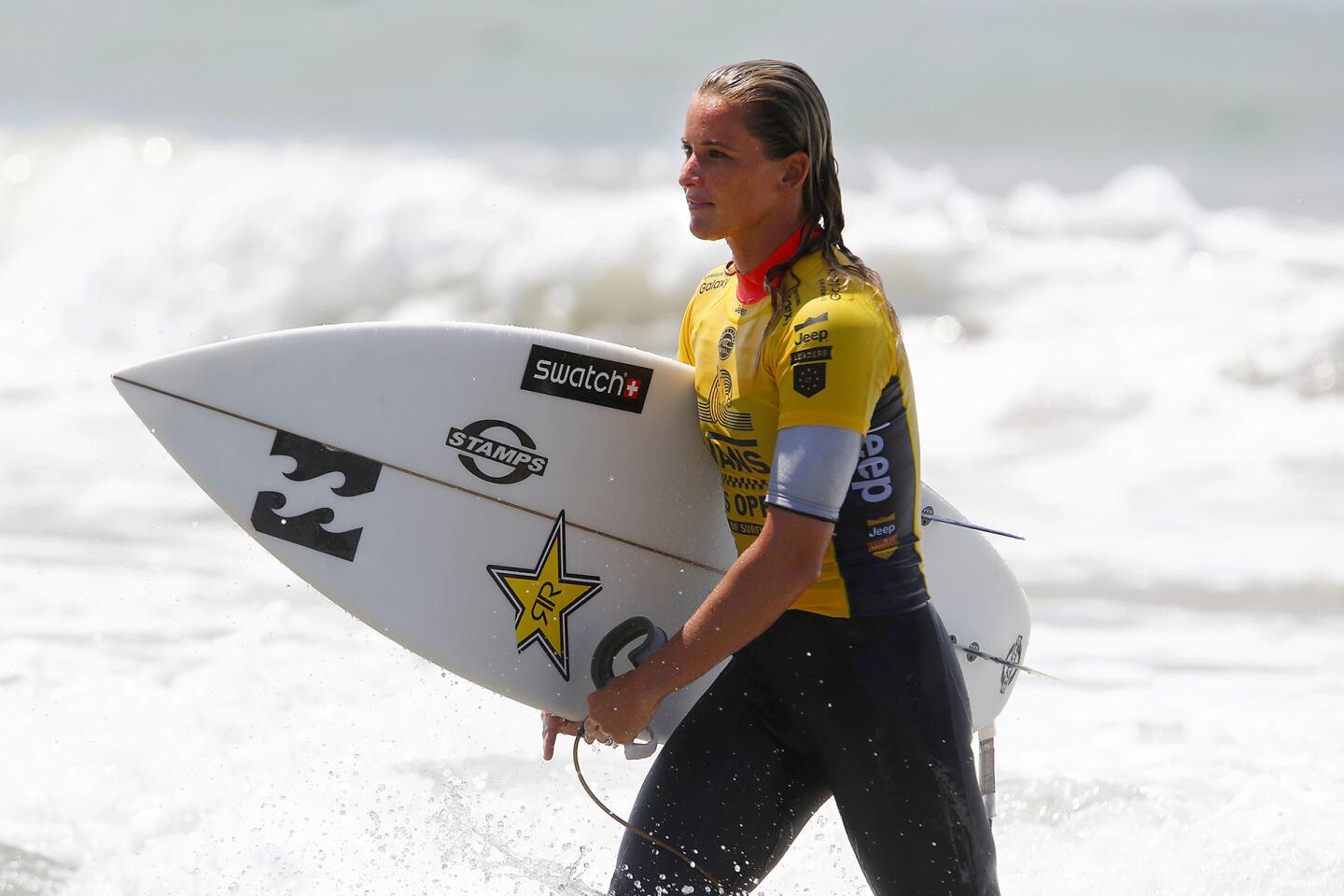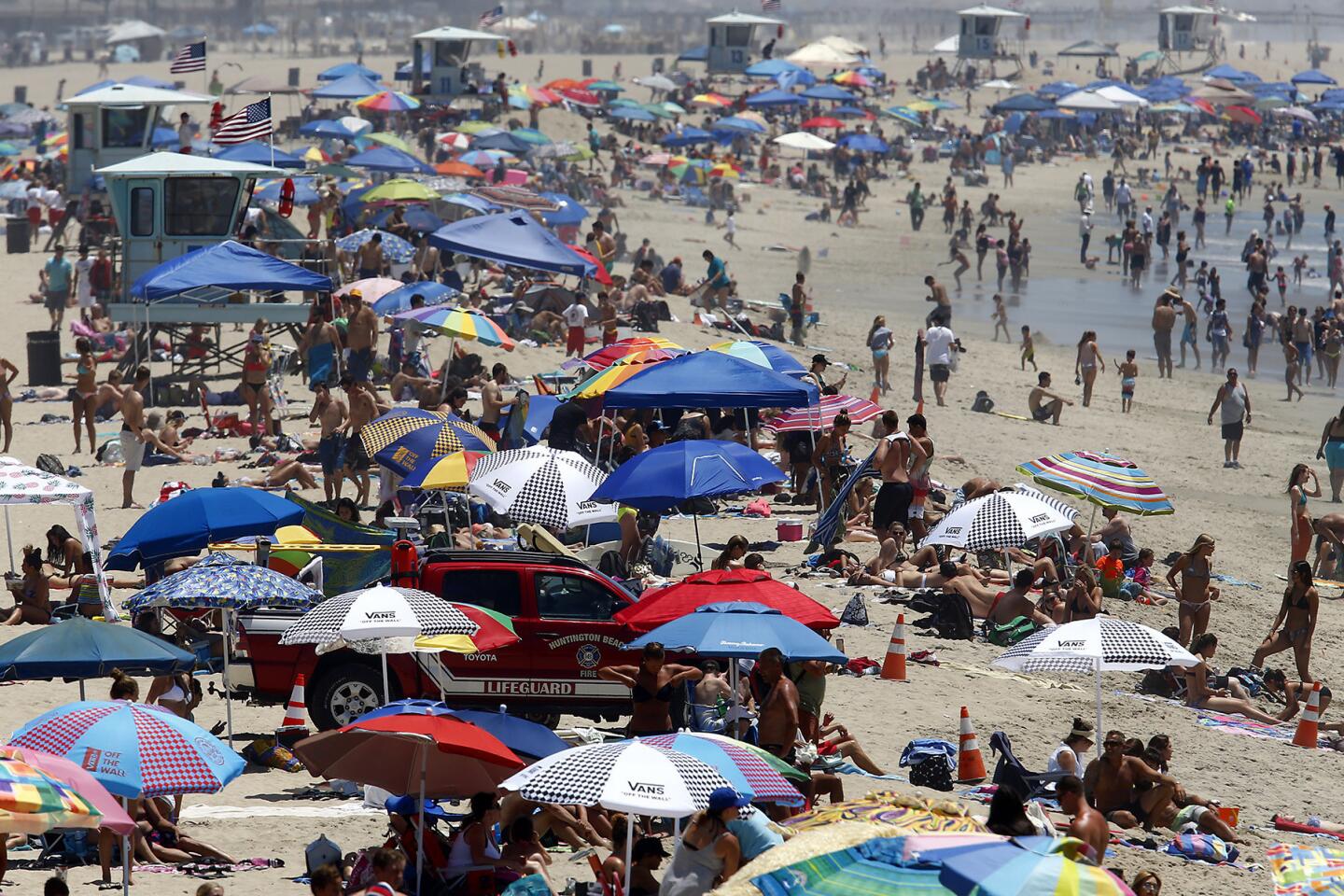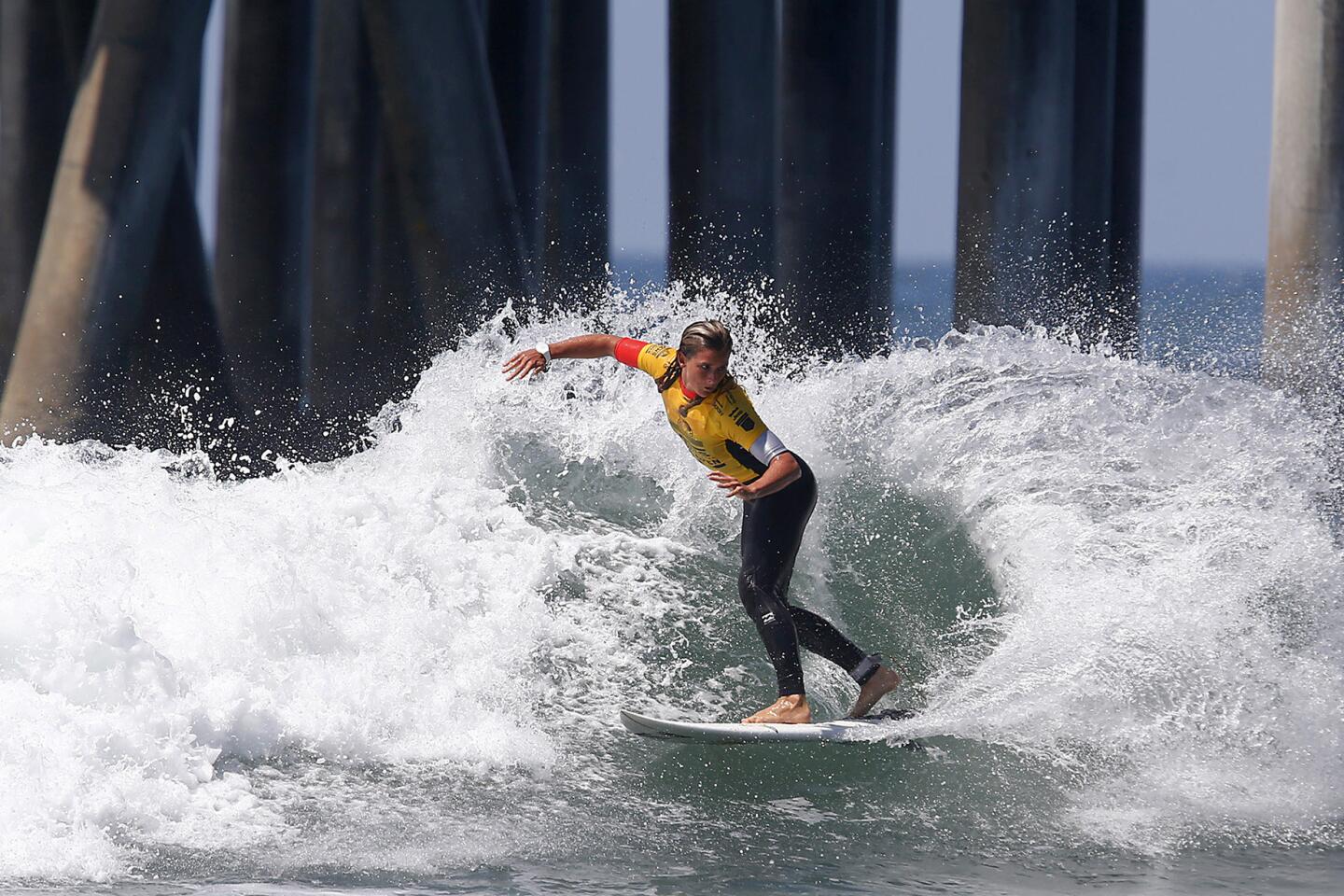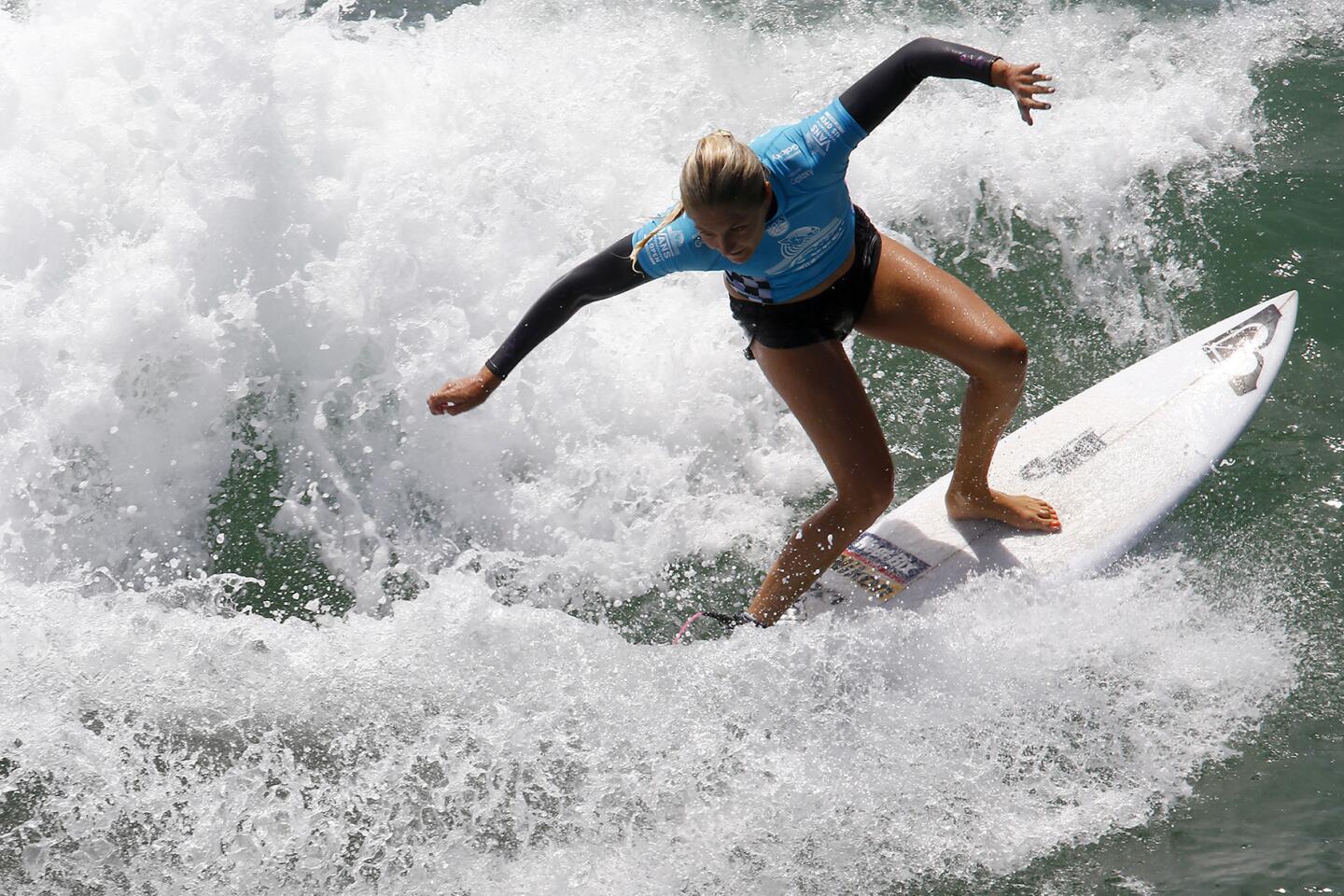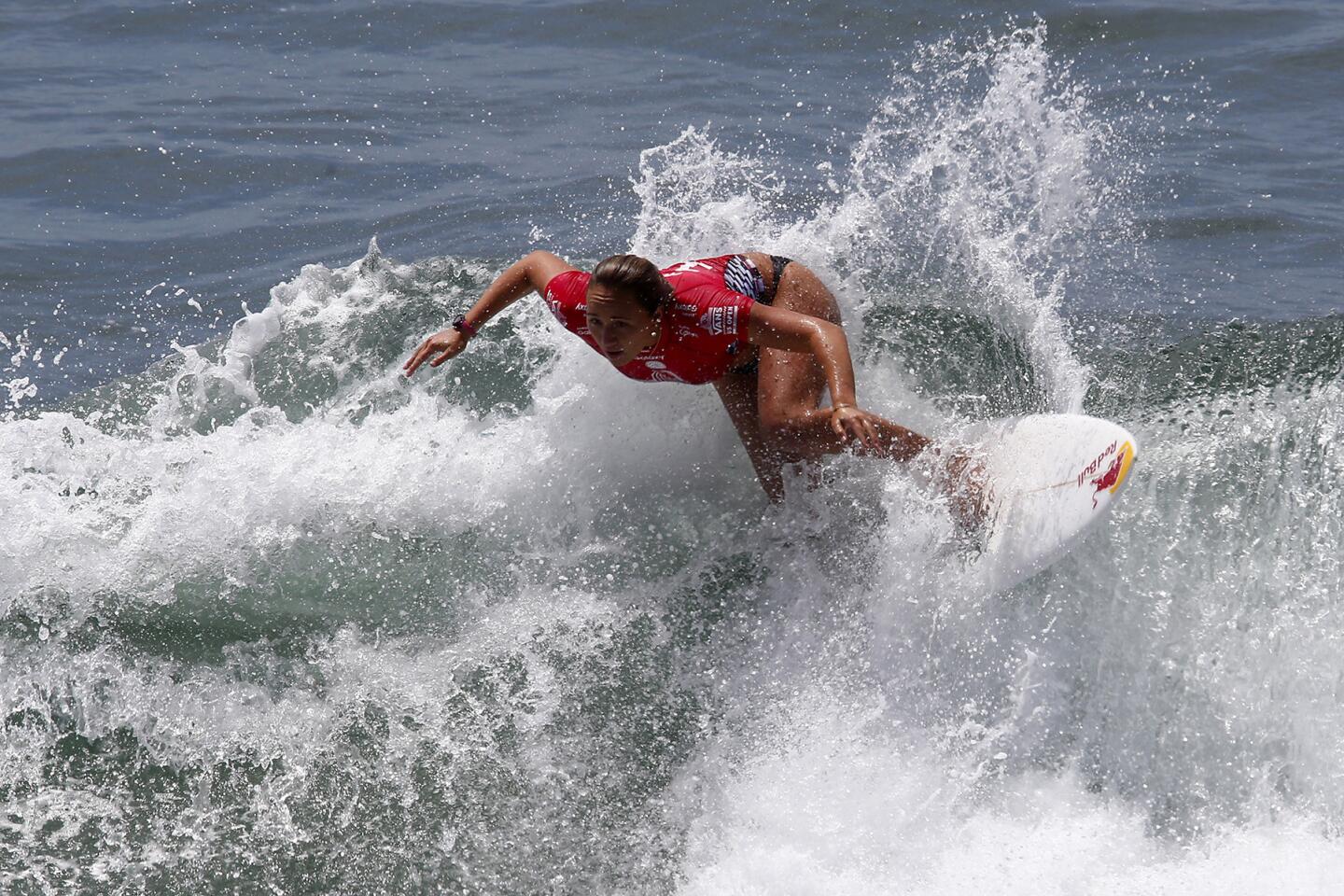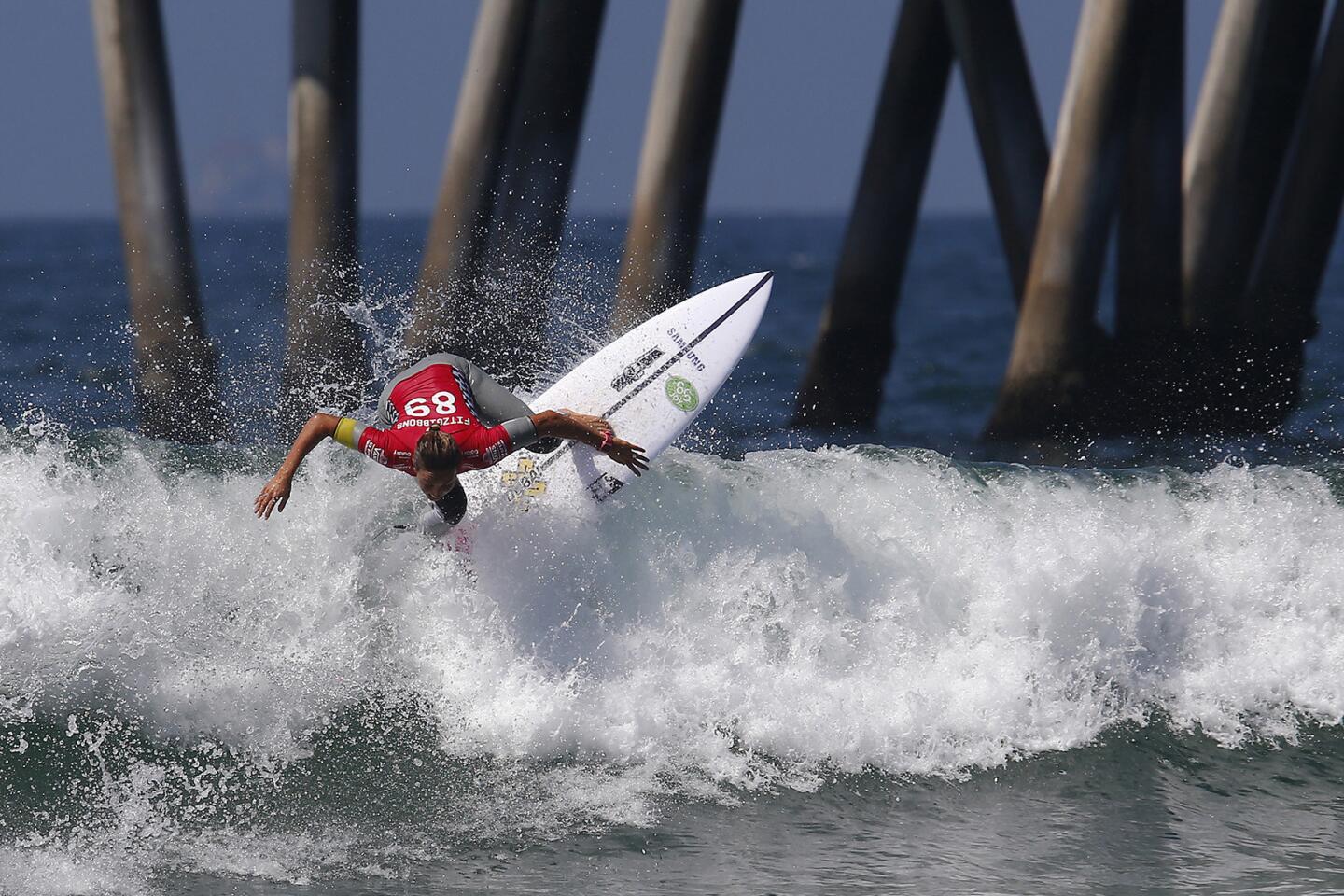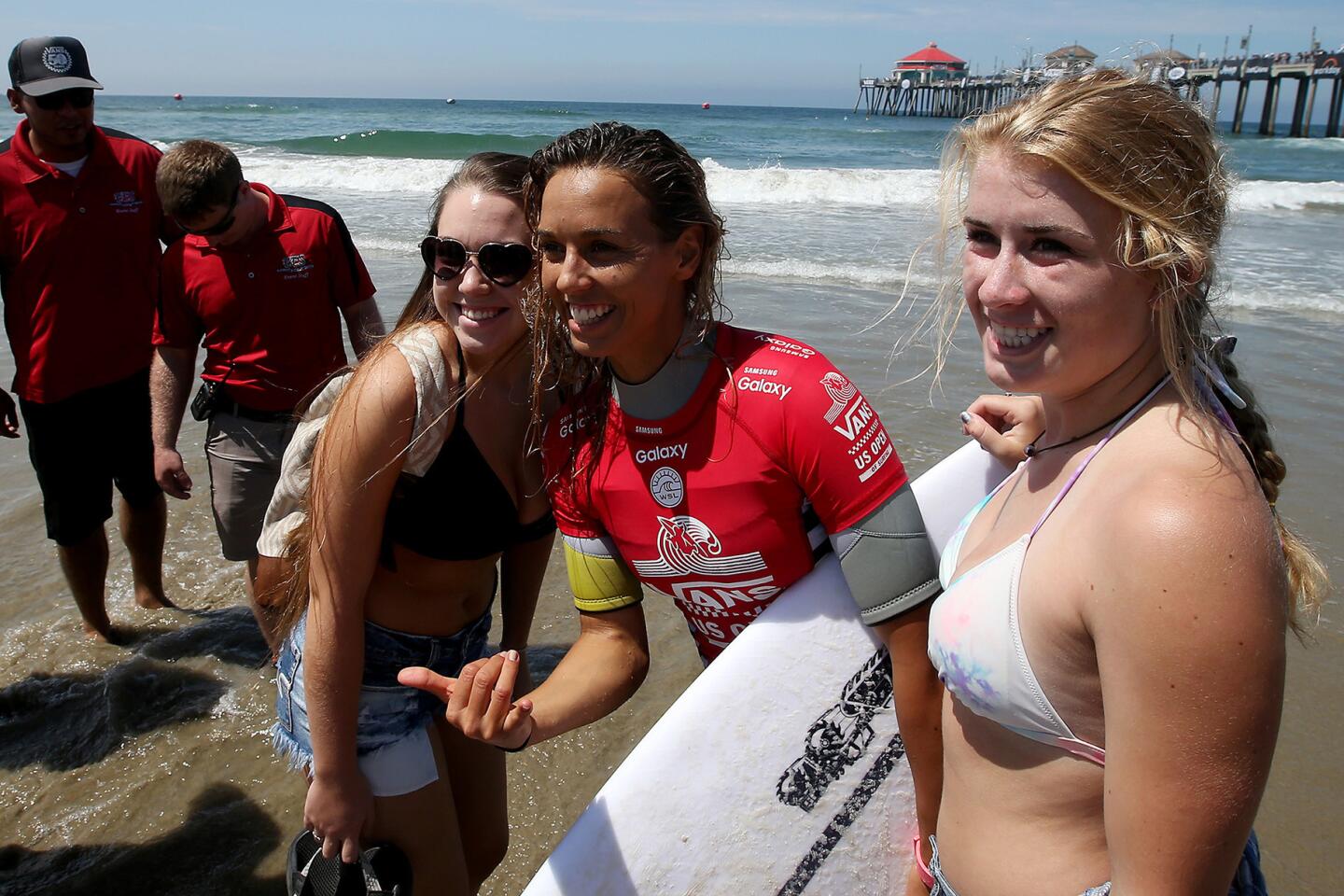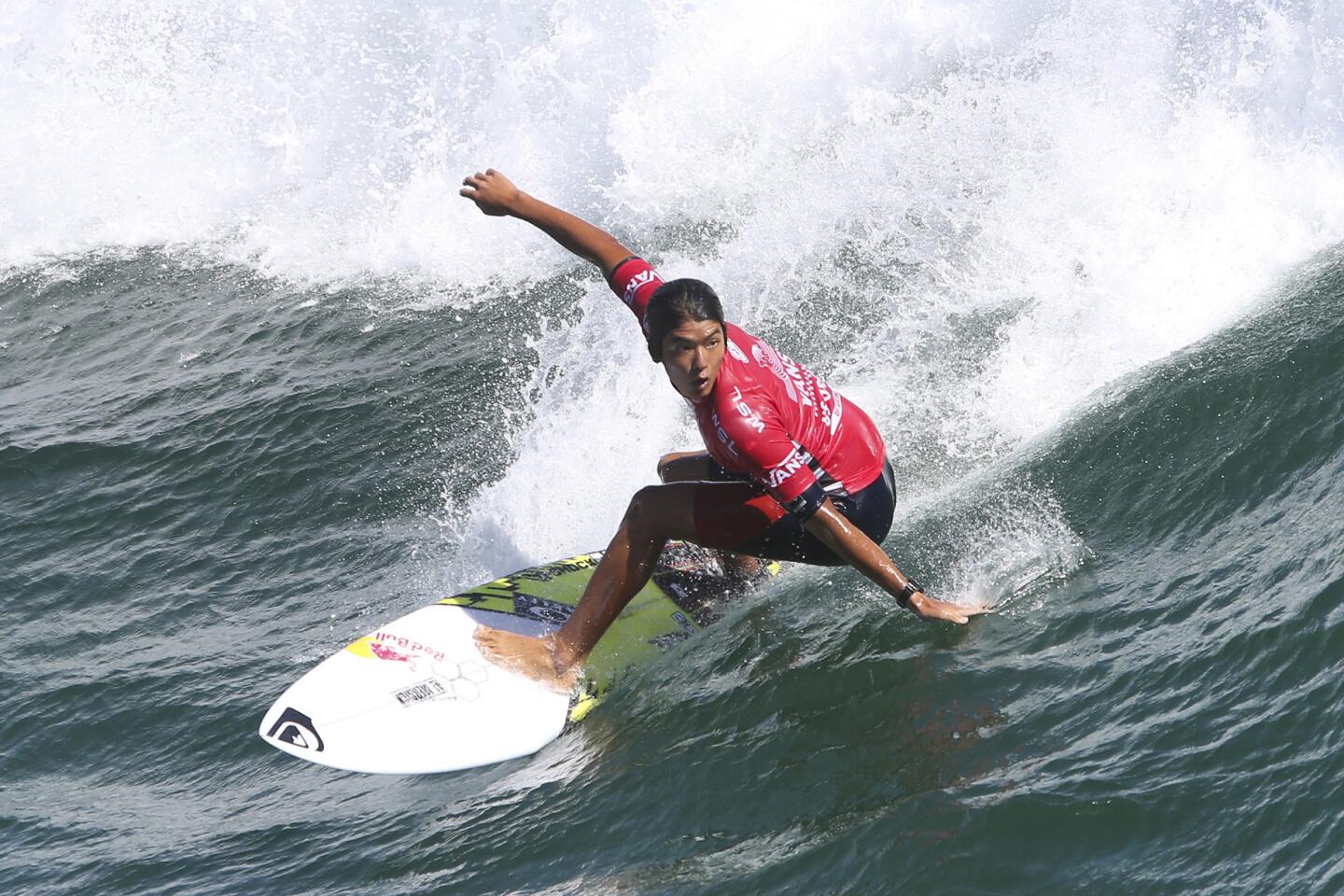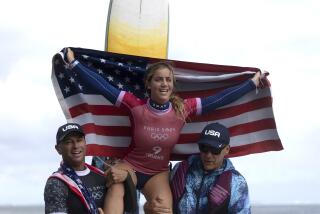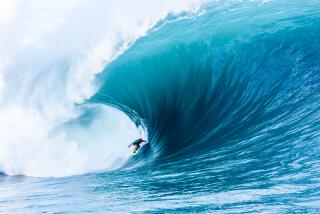When Jessi Miley-Dyer wakes up Sunday morning, the first thing she’ll do is run to the window and look at the ocean. She can’t see the contest area from her hotel room, but the waves up the beach will tell her if she made the right decision in tabling the most critical heats of the U.S. Open of Surfing to the competition’s final day.
As deputy commissioner of the World Surf League’s women’s Championship Tour, Miley-Dyer has teamed with Travis Logie to decide the time and day of each heat at Huntington Beach this week.
Miley-Dyer has juggled events for the women’s Championship Tour, men’s Qualifying Series, men’s Pro Junior and women’s Pro Junior — mixing and matching them since last Saturday, trying to give every surfer a chance to catch good waves. She’s read daily forecasts, tracked Hurricane Frank off the Pacific Coast and used her instincts as a former professional surfer to gauge when one swell may die down and the next could come in.
See the most-read stories in Sports this hour »
Considering all of that, she and Logie decided the final eight surfers in the Championship Tour and Qualifying Series events will compete on Sunday, when a new swell is expected.
Now all Miley-Dyer can do is sit back and hope it comes.
“The thing that makes surfing the most incredible sport can also be a double-edged sword,” she said Saturday. “The unpredictability of the ocean conditions is what makes it hard to schedule and that’s why we’re waiting for so long and trying to get the most information possible.”
Scheduling heats is much like surfing the waves themselves.
The ocean is fickle, and impossible to negotiate with; even the most calculated decisions can be spoiled by nature. That’s what each surfer faces paddling out for 30-minute heats, and what Miley-Dyer faces when deciding when they’ll take place.
As a hedge against that unpredictability, Miley-Dyer is constantly on the phone with forecasters at Surfline and talking with a Huntington Beach surfing director who knows the local swell. The daily forecasts she receives show predicted wave heights, approximate times when a swell could come in and how it’s expected to look throughout a given day.
She’s looking for a tight time period when the swell will drop, because one that is active for a long time will be “slower” and produce fewer waves.
“It is a lot of responsibility just because we want to give everyone the best opportunity possible to have good heats,” Miley-Dyer said. “There’s nothing worse [than] when you’re surfing and the tide is not quite right.”
The job is not made easier by Huntington Beach, nicknamed “Surf City” but known to be sporadic over the years. Miley-Dyer said that’s because the surf here breaks at different peaks up and down the beach, where a reef break, for example, will produce waves that break at the same peak every time.
1/44
Filipe Toledo celebrates with fans after winning the men’s title at the 2016 U.S. Open of Surfing in Huntingon Beach on Sunday.
(Harrison Hill / Los Angeles Times) 2/44
Brazilian surfer Filipe Toledo, 21, is swarmed by fans after winning the Vans US Open of Surfng title.
(Luis Sinco / Los Angeles Times) 3/44
Fans cheer as Brazilian surfer Filipe Toledo, 21, defeats Ethan Ewing for the Vans US Open of Surfng title.
(Luis Sinco / Los Angeles Times) 4/44
Filipe Toledo cuts away from the Huntington Beach pier during the finals of the U.S. Open of Surfing.
(Harrison Hill / Los Angeles Times) 5/44
Australian Ethan Ewing, 17, competes against Filipe Toledo in the final round.
(Luis Sinco / Los Angeles Times) 6/44
Tatiana Weston-Webb lets out a victory yell after winning the women’s title at the U.S. Open of Surfing on Sunday in Huntington Beach. (Harrison Hill / Los Angeles Times)
7/44
Fans carry American surfer Tatiana Weston-Webb, 20, ashore after she defeated Malia Manuel for the women’s title.
(Luis Sinco / Los Angeles Times) 8/44
American surfer Tatiana Weston-Webb, 20, reacts after defeating Malia Manuel for the women’s title.
(Luis Sinco / Los Angeles Times) 9/44
Tatiana Weston-Webb competes in the finals of the U.S. Open of Surfing on Sunday in Huntington Beach.
(Harrison Hill / Los Angeles Times) 10/44
Hometown surfer Kanoa Igarashi gathers his thoughts before competing in a semifinal round.
(Luis Sinco / Los Angeles Times) 11/44
Thousands of surf fans watch the final day of competition at the 2016 Vans U.S. Open of Surfing at Huntington Beach.
(Harrison Hill / Los Angeles Times) 12/44
Adriano De Souza loses control of his board while competing in the semifinals of the US Open of Surfing.
(Harrison Hill / Los Angeles Times) 13/44
Ethan Ewing, who would finish second, cuts off the top of a wave during the finals of the U.S. Open of Surfing.
(Harrison Hill / Los Angeles Times) 14/44
Torrey Meister during round four of the Vans U.S. Open of Surfing in Huntington Beach. Meister finished first in his heat.
(Gary Coronado / Los Angeles Times) 15/44
Josh Davis, 16, of Sacramento keeps cool under the pier while the Vans U.S. Open of Surfing competition takes place in Huntington Beach on Friday.
(Gary Coronado / Los Angeles Times) 16/44
Conner Coffin, left, and Matt Banting collide during round four of the Vans U.S. Open of Surfing in Huntington Beach on Friday.
(Gary Coronado / Los Angeles Times) 17/44
Kanoa Igarashi signs an autograph for Kalea Mussack, 2, of Huntington Beach after competing in round four of the Vans U.S. Open of Surfing in Huntington Beach.
(Gary Coronado / Los Angeles Times) 18/44
Brett Simpson cuts back on a wave during round four of the Vans U.S. Open of Surfing in Huntington Beach. The two-time Open champion finished third in heat and failed to advance.
(Gary Coronado / Los Angeles Times) 19/44
Filipe Toledo cuts back on a wave during the fourth round of the Vans U.S. Open of Surfing in Huntington Beach. Toledo finished first in heat seven.
(Gary Coronado / Los Angeles Times) 20/44
A fan carries a shark floatie while the Vans U.S. Open of Surfing competition takes place in Huntington Beach on Friday.
(Gary Coronado / Los Angeles Times) 21/44
Deivid Silva rides a wave near the Huntington Beach pier during the fourth round at the U.S. Open of Surfing on Friday. (Gary Coronado / Los Angeles Times)
22/44
Bino Lopes cuts back atop a wave during round four of the Vans U.S. Open of Surfing in Huntington Beach.
(Gary Coronado / Los Angeles Times) 23/44
Surfer Kanoa Igarashi rides a wave during the US Open of Surfing at Huntington Beach on Thursday.
(Harrison Hill / Los Angeles Times) 24/44
Surfer Kanoa Igarashi takes a picture with fans after competing in round 3 of the men’s qualifying series during the US Open of Surfing at Huntington Beach. Igarashi placed first in his heat.
(Harrison Hill / Los Angeles Times) 25/44
Tanner Gudauskas competes during the third round of the U.S. Open of Surfing on Thursday, July 28, 2016.
(Dillon Deaton / Los Angeles Times) 26/44
Brazilian native Bino Lopes rides a wave during the US Open of Surfing at Huntington Beach.
(Harrison Hill / Los Angeles Times) 27/44
Australian surfer Jack Freestone competes during round 3 of the mens qualifying series during the US Open of Surfing at Huntington Beach.
(Harrison Hill / Los Angeles Times) 28/44
Surfer Carlos Munoz competes during round 3 of the mens qualifying series during the US Open of Surfing at Huntington Beach.
(Harrison Hill / Los Angeles Times) 29/44
Brazilian Surfer Michael Rodrigues competes during round 3 of the mens qualifying series during the US Open of Surfing at Huntington Beach.
(Harrison Hill / Los Angeles Times) 30/44
Surfer Tanner Gudauskas competes during round 3 of the mens qualifying series during the US Open of Surfing at Huntington Beach.
(Harrison Hill / Los Angeles Times) 31/44
Patrick Gudaukas of La Jolla ompetes in third round of the Vans U.S. Open of Surfing in Huntington Beach on Wednesday.
(Luis Sinco / Los Angeles Times) 32/44
Patrick Gudaukas poses for a photo with a fan after competing during the third round of the U.S. Open of Surfing on Wednesday.
(Luis Sinco / Los Angeles Times) 33/44
Australian Ethan Ewing competes during the third round of the U.S. Open of Surfing on Wednesday. Ewing, 17, is making his Huntington Beach debut.
(Luis Sinco / Los Angeles Times) 34/44
Hawaiian surfer Keanu Asing competes during the third round of the U.S. Open of Surfing in Huntington Beach on Wednesday.
(Luis Sinco / Los Angeles Times) 35/44
Australian Keely Andrew competes during the third round of the U.S. Open of Surfing on Wednesday.
(Luis Sinco / Los Angeles Times) 36/44
Courtney Conlogue emerges from the surf after competing in the third round of the Vans U.S. Open of Surfing on Wednesday. Conlogue is currently the top-ranked women’s surfer in the world.
(Luis Sinco / Los Angeles Times) 37/44
Surfing fans stake out their spots on the sand for the third round of the Vans U.S. Open of Surfing in Huntington Beach on Wednesday.
(Luis Sinco / Los Angeles Times) 38/44
Courtney Conlogue of Santa Ana cuts away from the Huntington Beach Pier as she competes in third round of the Vans U.S. Open of Surfing on Wednesday.
(Luis Sinco / Los Angeles Times) 39/44
Australian Stephanie Gilmore competes during the third round of the Vans U.S. Open of Surfing on Wednesday. Gilmore, 28, is a six-time world champion.
(Luis Sinco / Los Angeles Times) 40/44
Carissa Kainani of Hawaii cuts off the top of a wave during the third round of the Vans U.S. Open of Surfing on Wednesday.
(Luis Sinco / Los Angeles Times) 41/44
Lakey Peterson of Santa Barbara cuts back into a wave during the third round of competition at the Vans U.S. Open of Surfing in Huntington Beach on Wednesday.
(Luis Sinco / Los Angeles Times) 42/44
Australian Sally Fitzgibbons turns away from the Huntington Beach Pier as she competes during the third round of the Vans U.S. Open of Surfing on Wednesday.
(Luis Sinco / Los Angeles Times) 43/44
Australian surfer Sally Fitzgibbons, 25, mingles with fans after competing in third round of the Vans U.S. Open of Surfing on Wednesday.
(Luis Sinco / Los Angeles Times) 44/44
Huntington Beach’s Kanoa Igarashi rides a wave during the U.S. Open of Surfing at Huntington Beach on Wednesday.
(Harrison Hill / Los Angeles Times) Surfers have mentioned Huntington Beach’s unpredictability throughout the competition, with a strong swell at the start of the week and less giving waters since.
“I was a bit surprised, we were supposed to have more waves today than yesterday and they were actually a bit smaller,” Sebastian Zietz said after narrowly winning his fifth-round heat Saturday. “You just have to make the best of the opportunities you get.”
On Friday afternoon, Miley-Dyer and Logie locked in the risky plan to start the women’s and men’s quarterfinals on Sunday. With Hurricane Frank moving away from the coast and the weeklong swell subsiding, all of the forecasts have indicated the next swell is right behind it. The men will start at 8 a.m., so the women’s event will unfold after a high tide that Miley-Dyer said can “swallow the swell a little bit.”
After a week of studying projected wave heights, offshore storms, high tide, low tide, this swell and that one, the puzzle is complete.
If Miley-Dyer gets to her window and sees a new energy in the waves, she’ll know she pressed the right buttons. If the energy’s not there, she’ll chalk one up for Mother Nature and know she did all she could.
“If we wait until the end of the week and it’s still bad because the new tide didn’t really come, then we gave ourselves the best opportunities,” Miley-Dyer said. “At some point we’re rolling the dice, because the ocean is something we can’t control.”
Follow Jesse Dougherty on Twitter @Dougherty_Jesse

